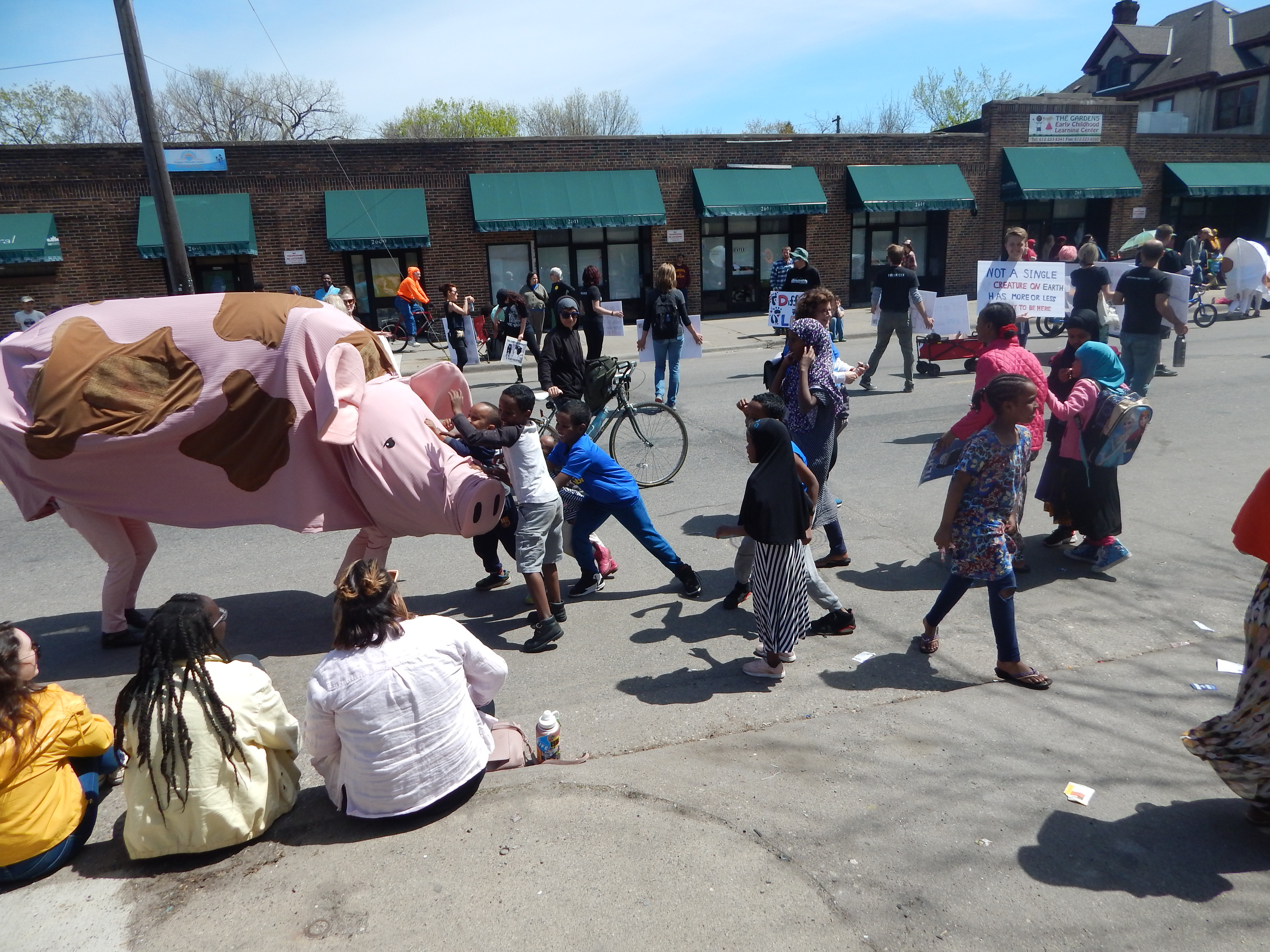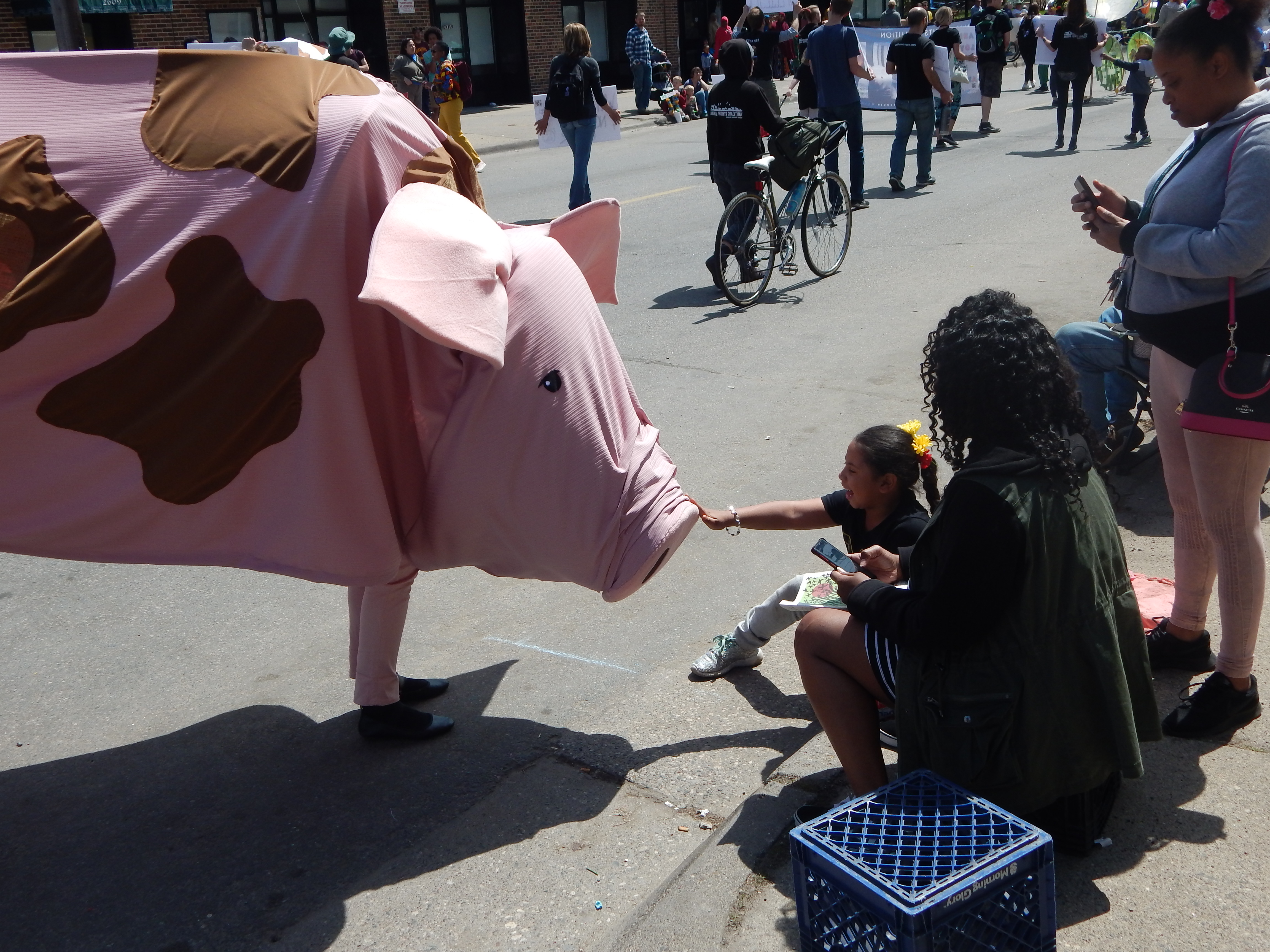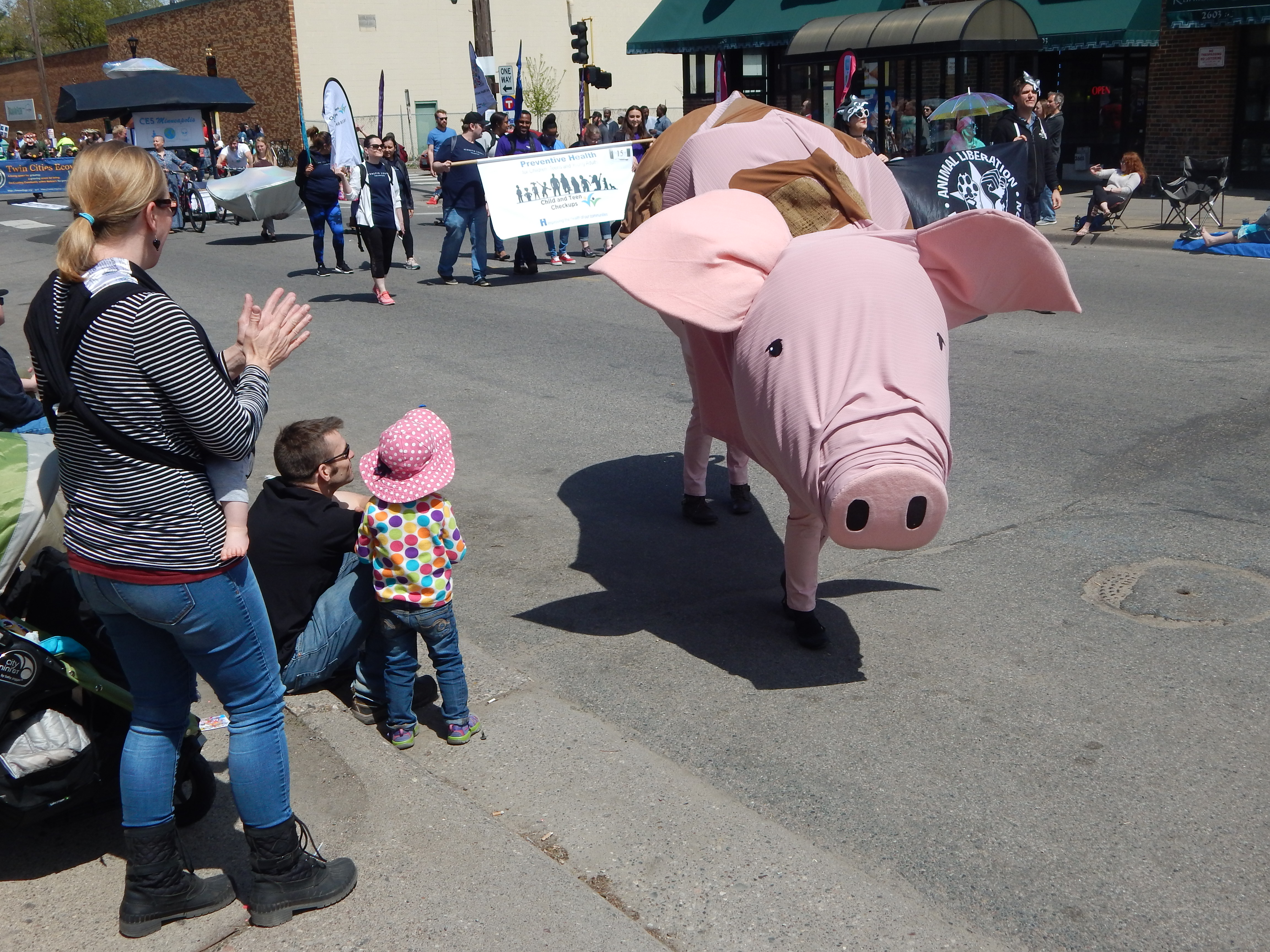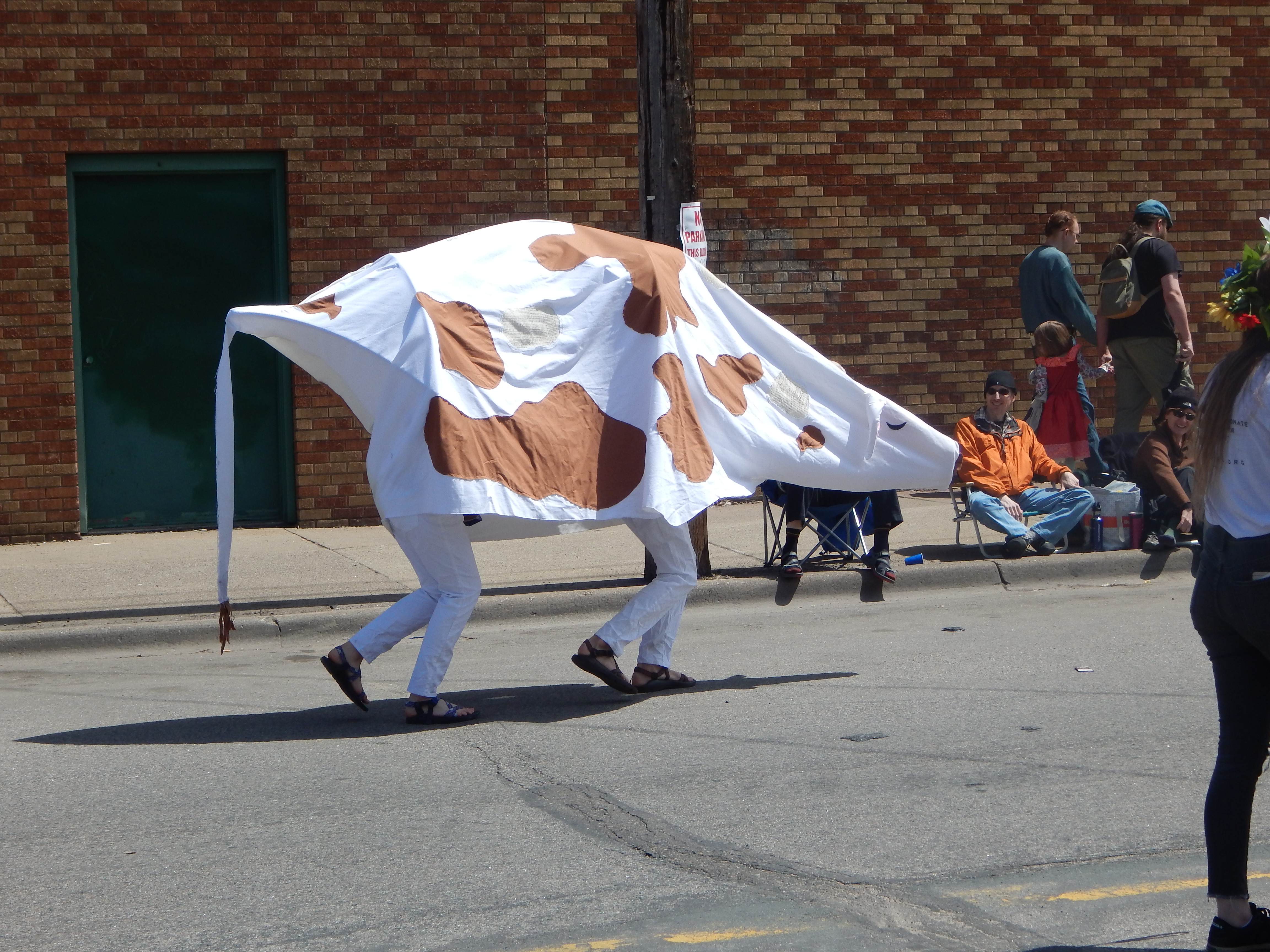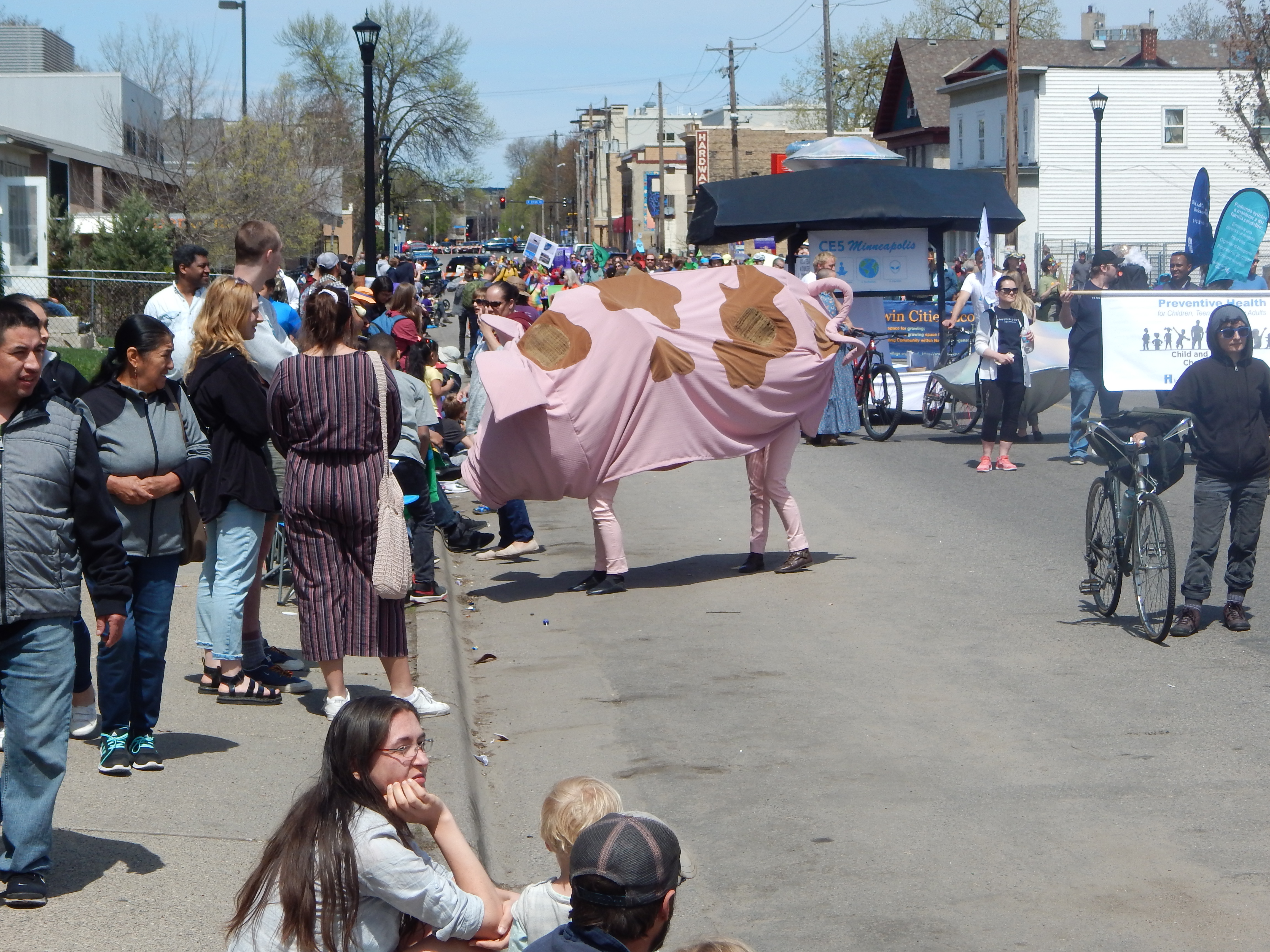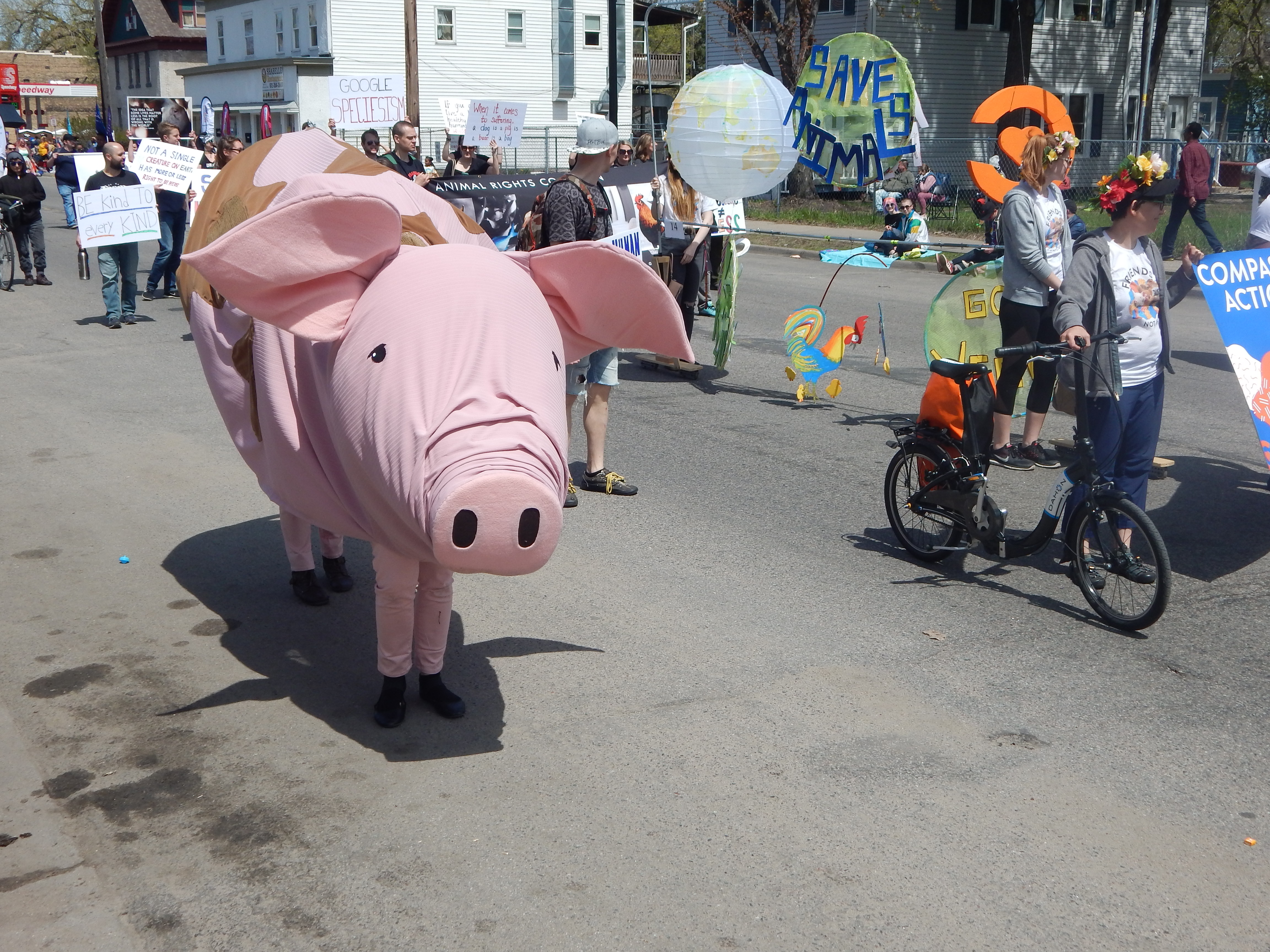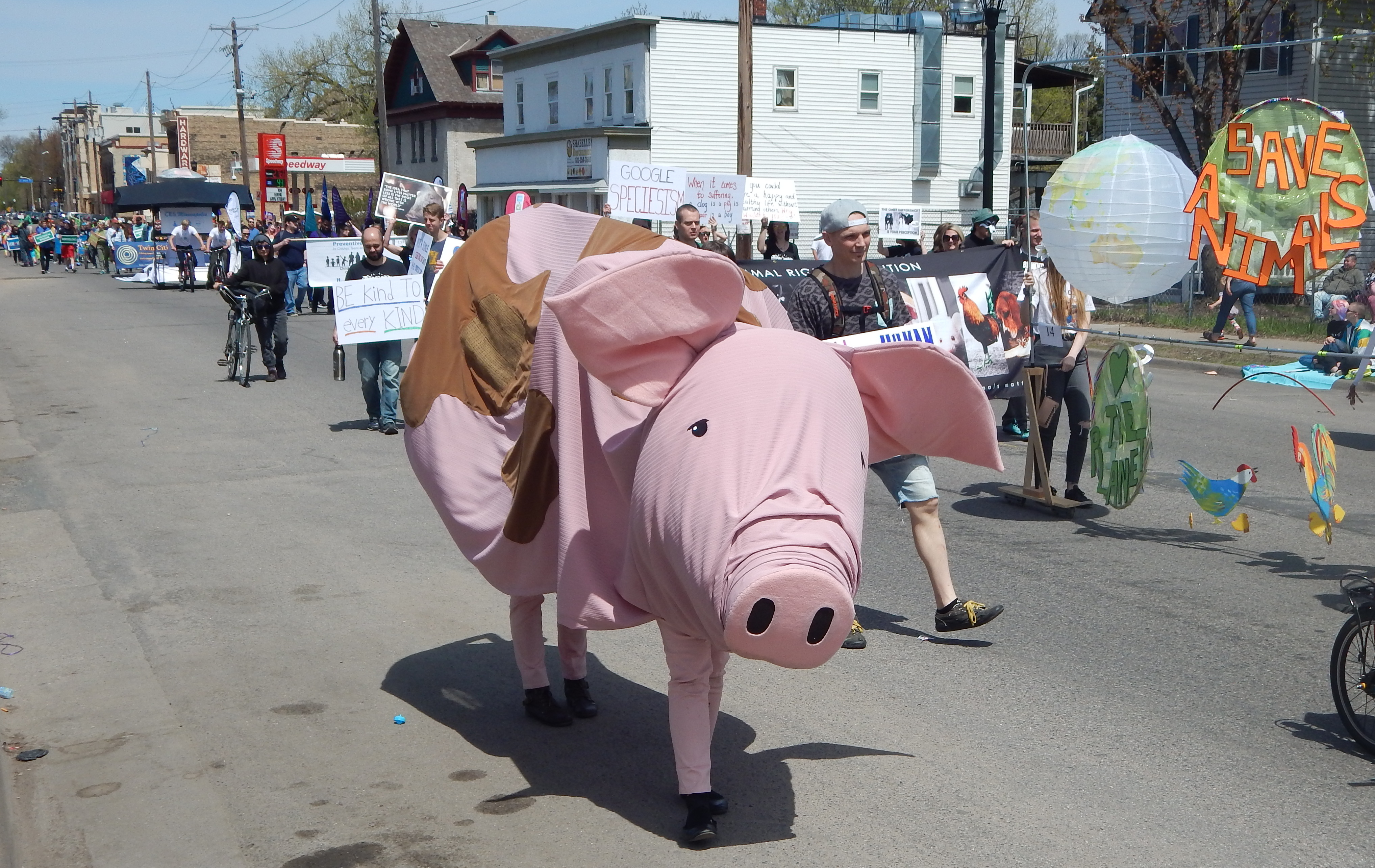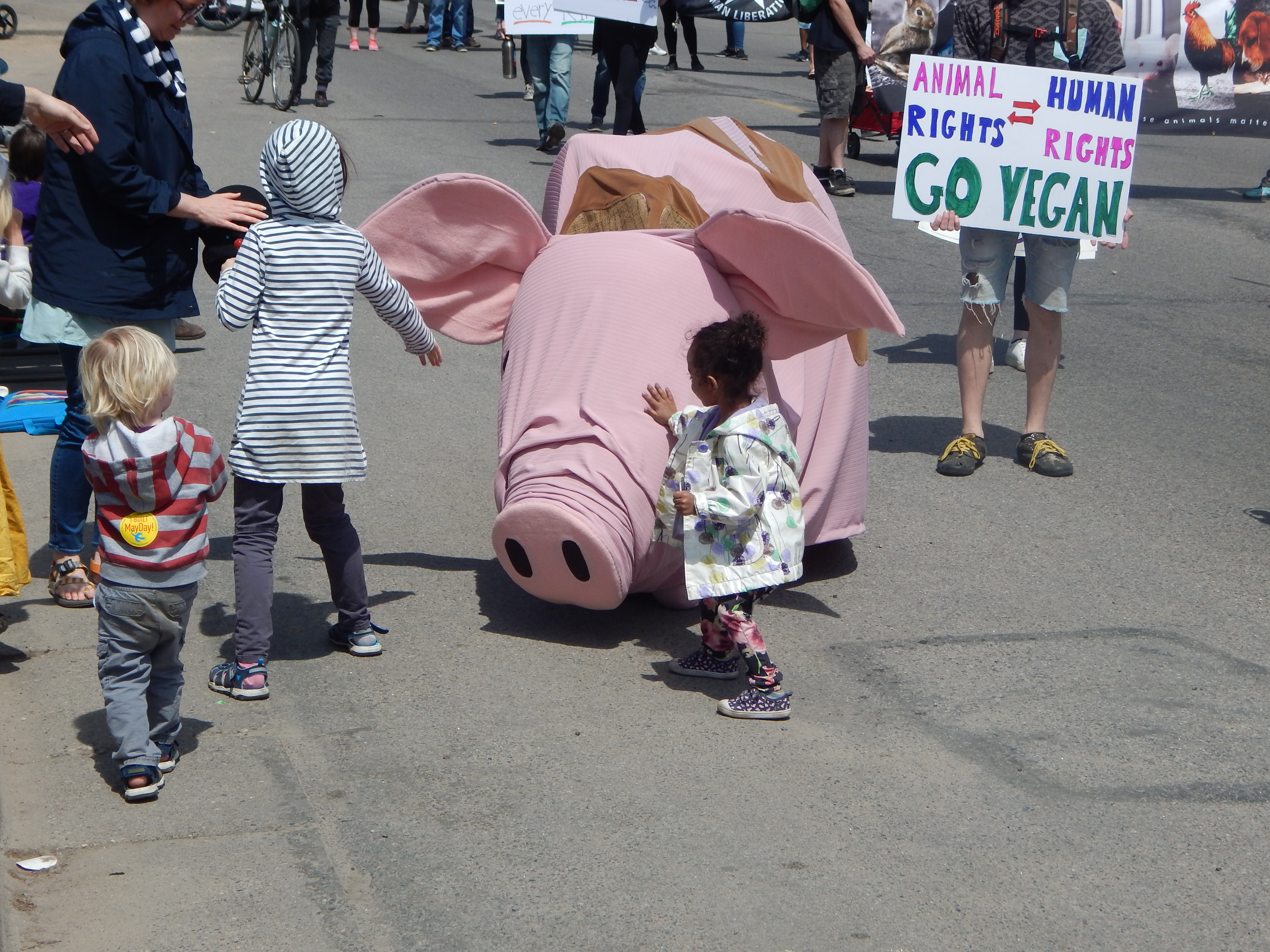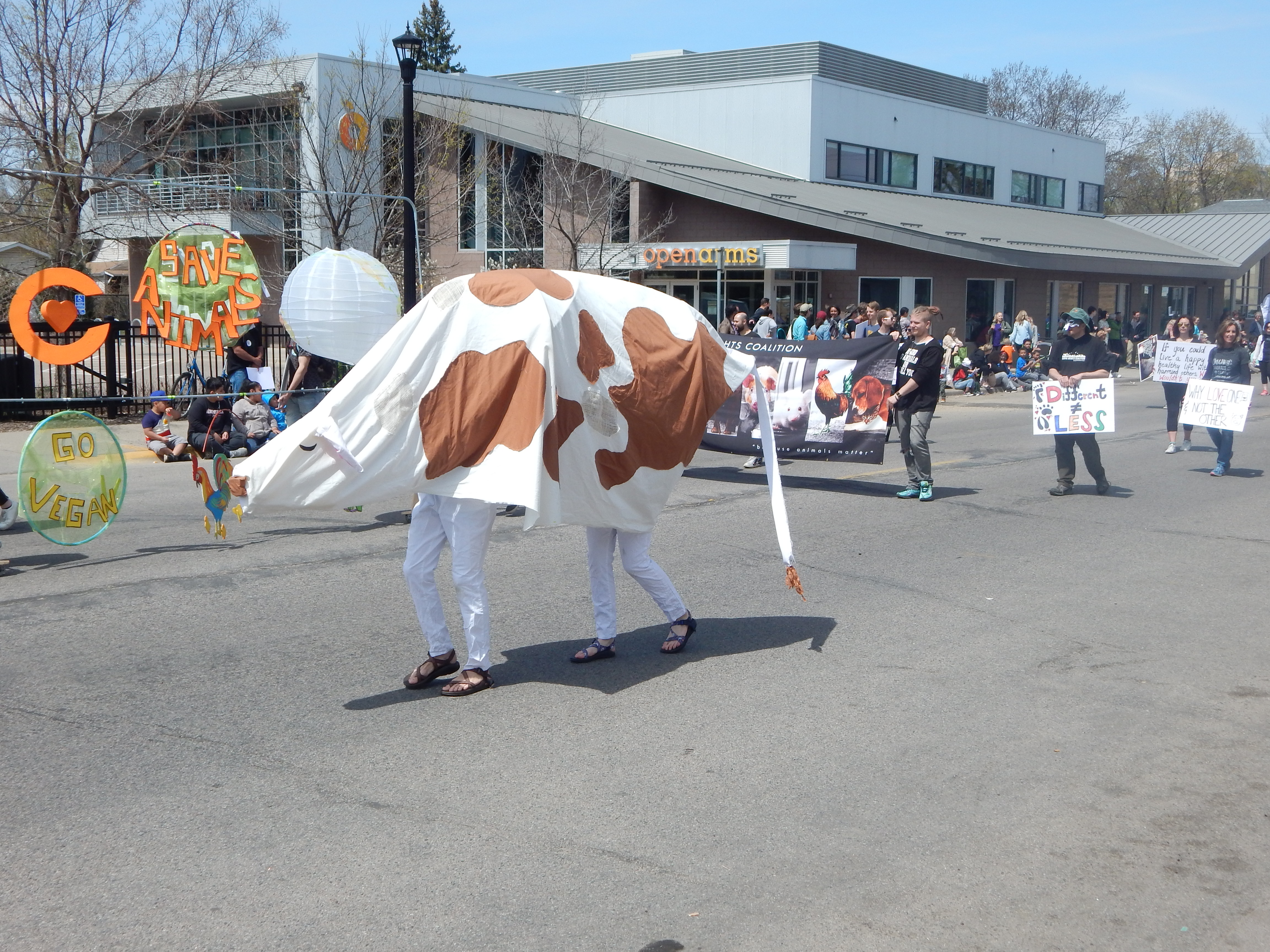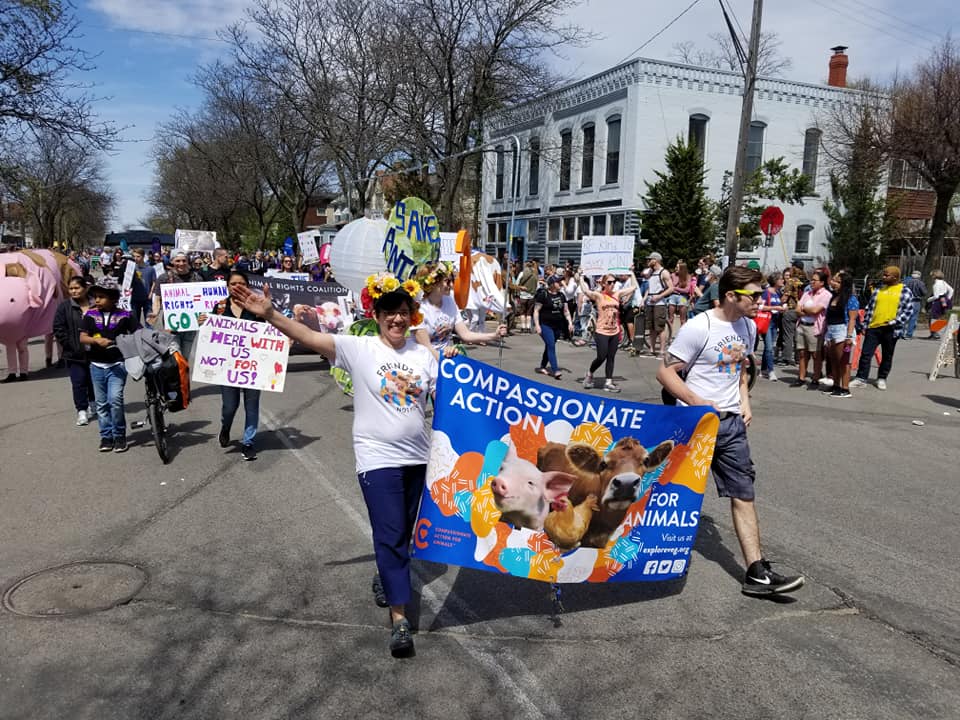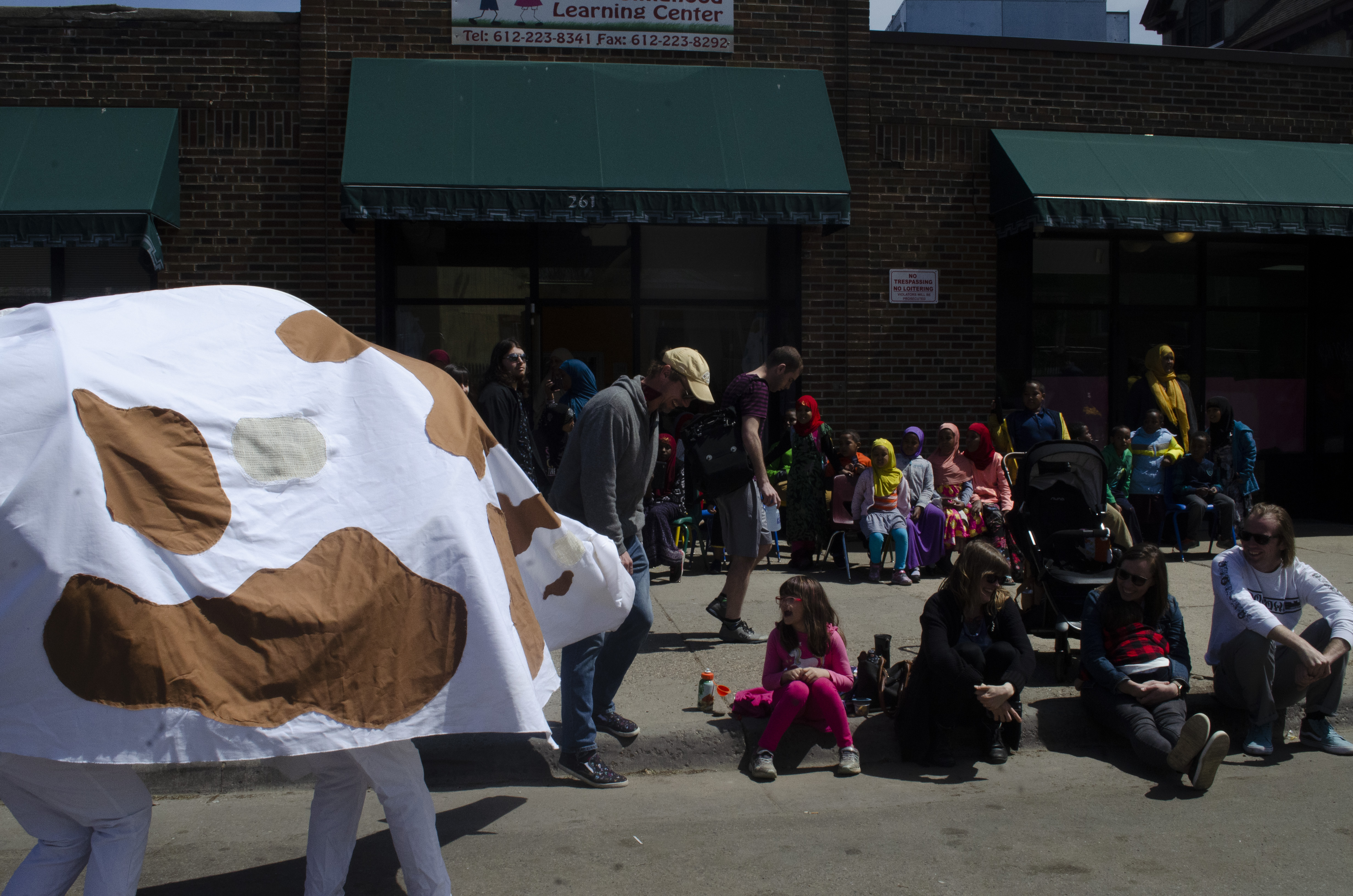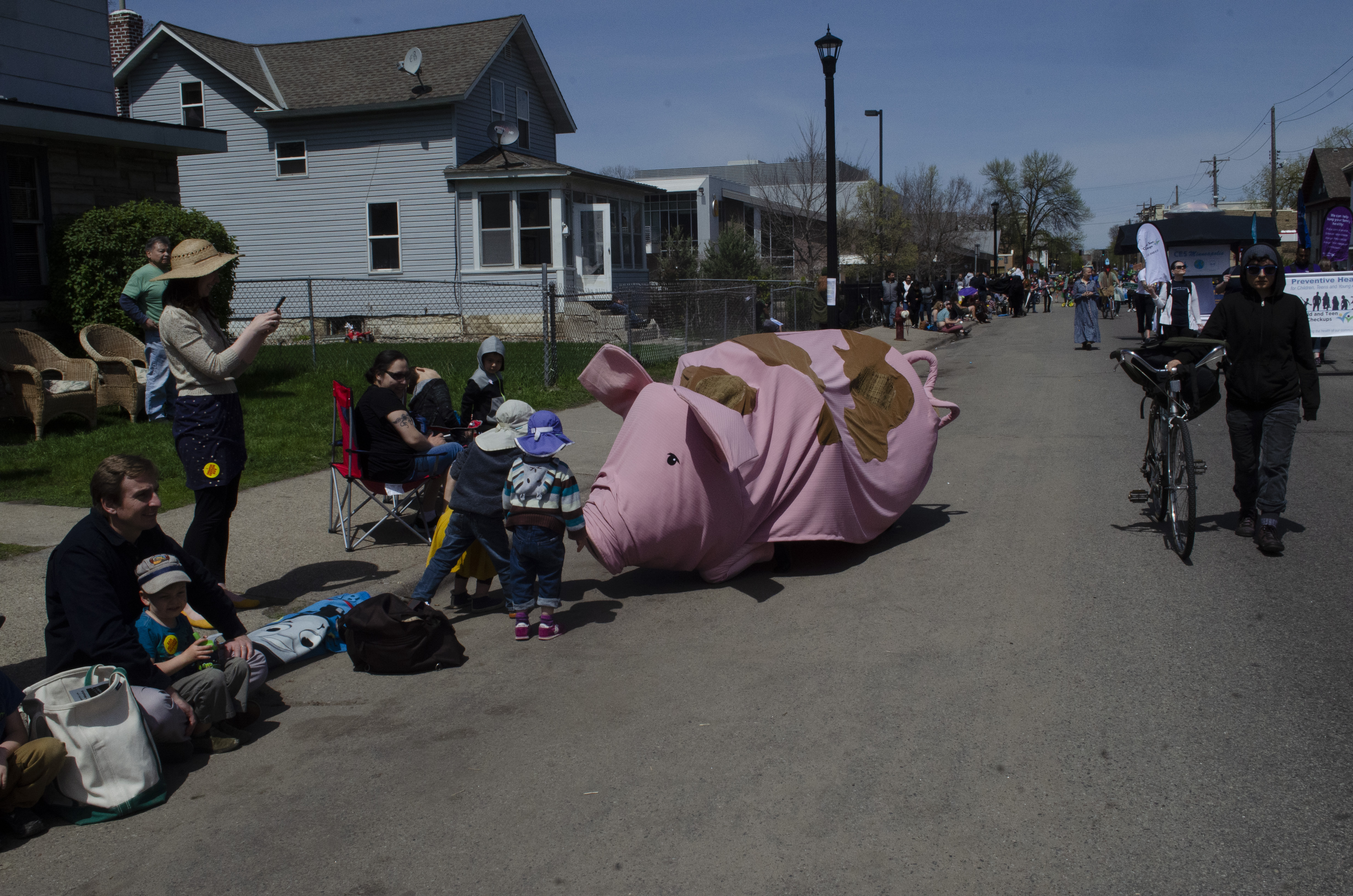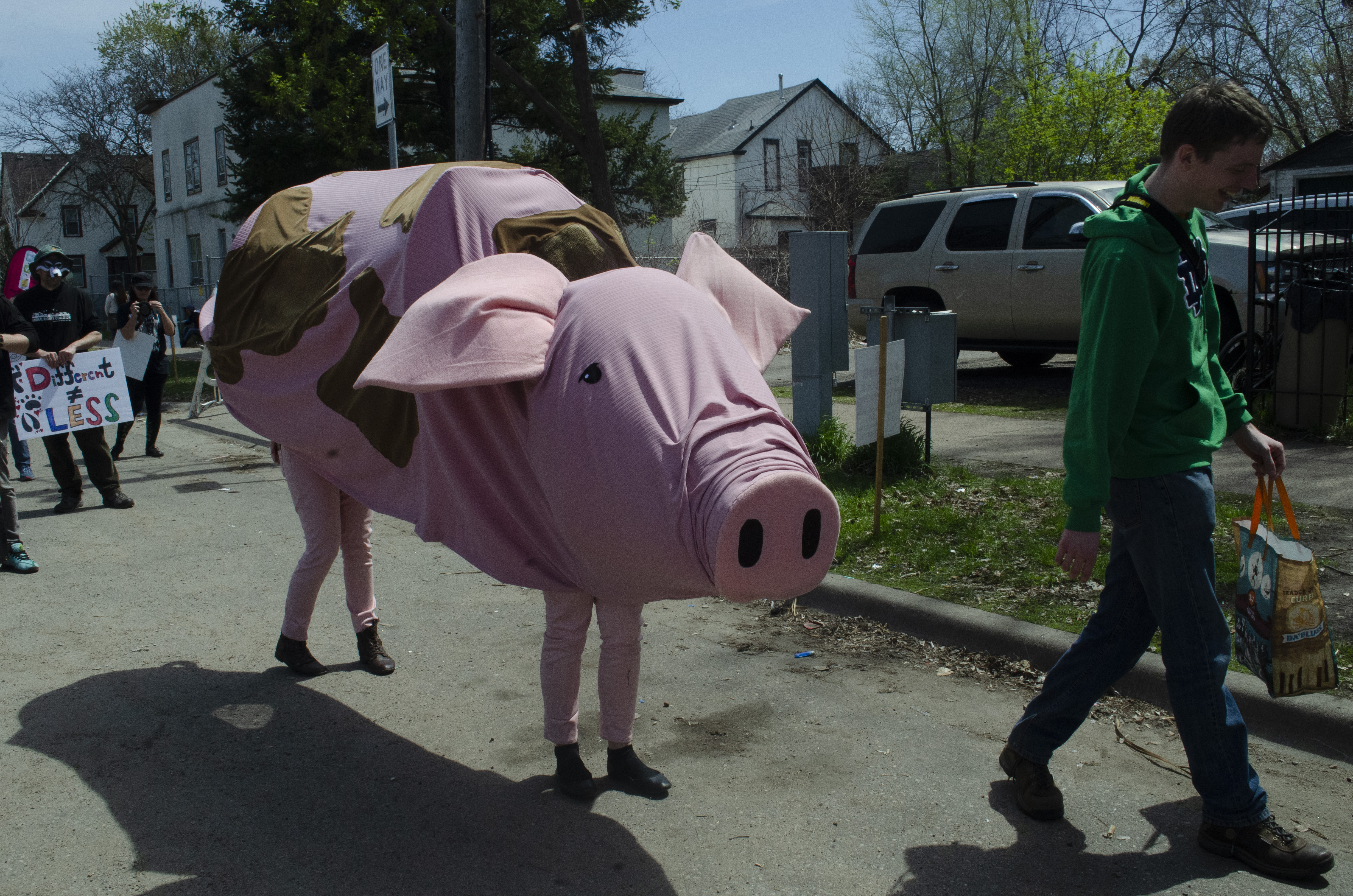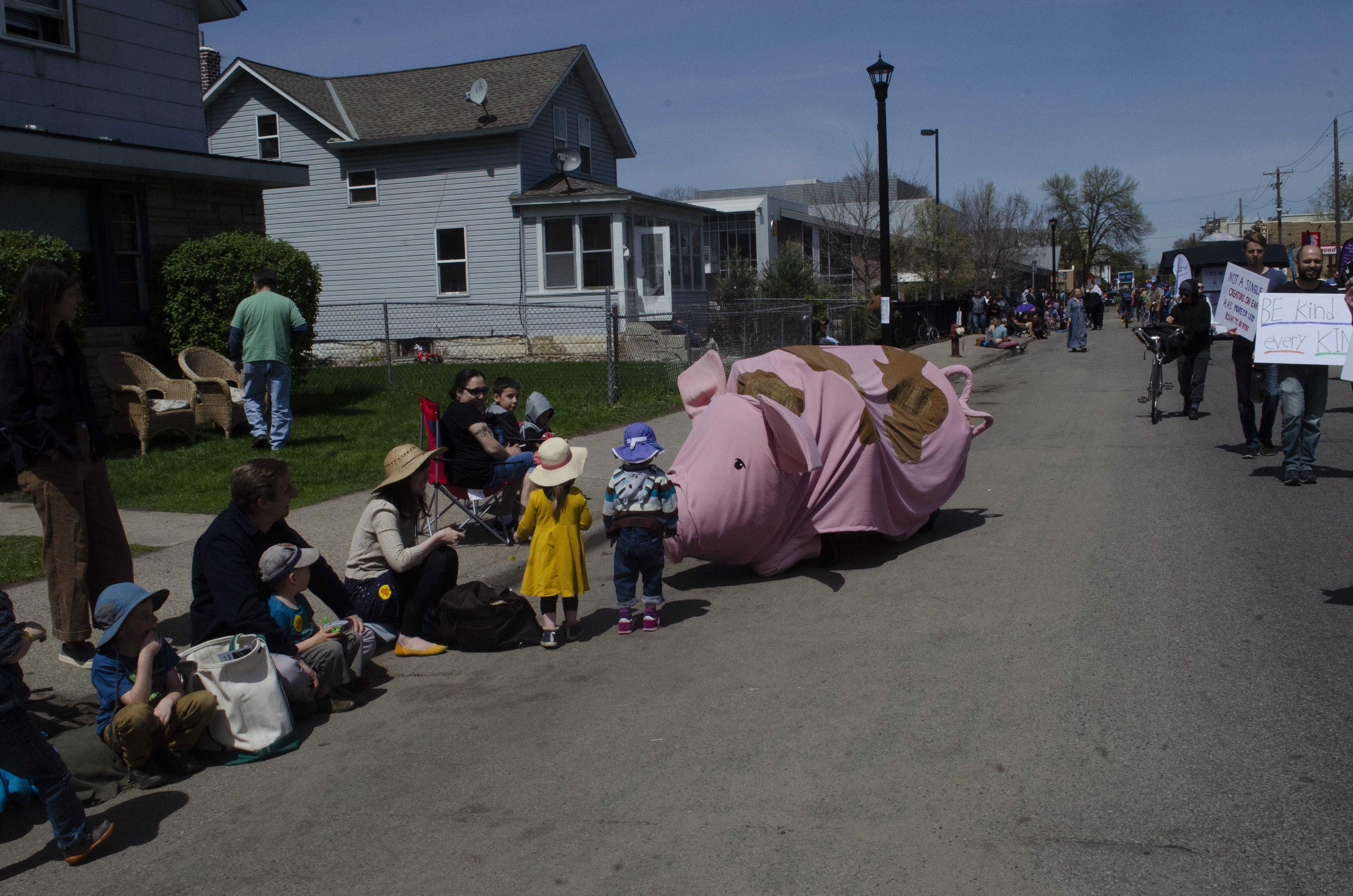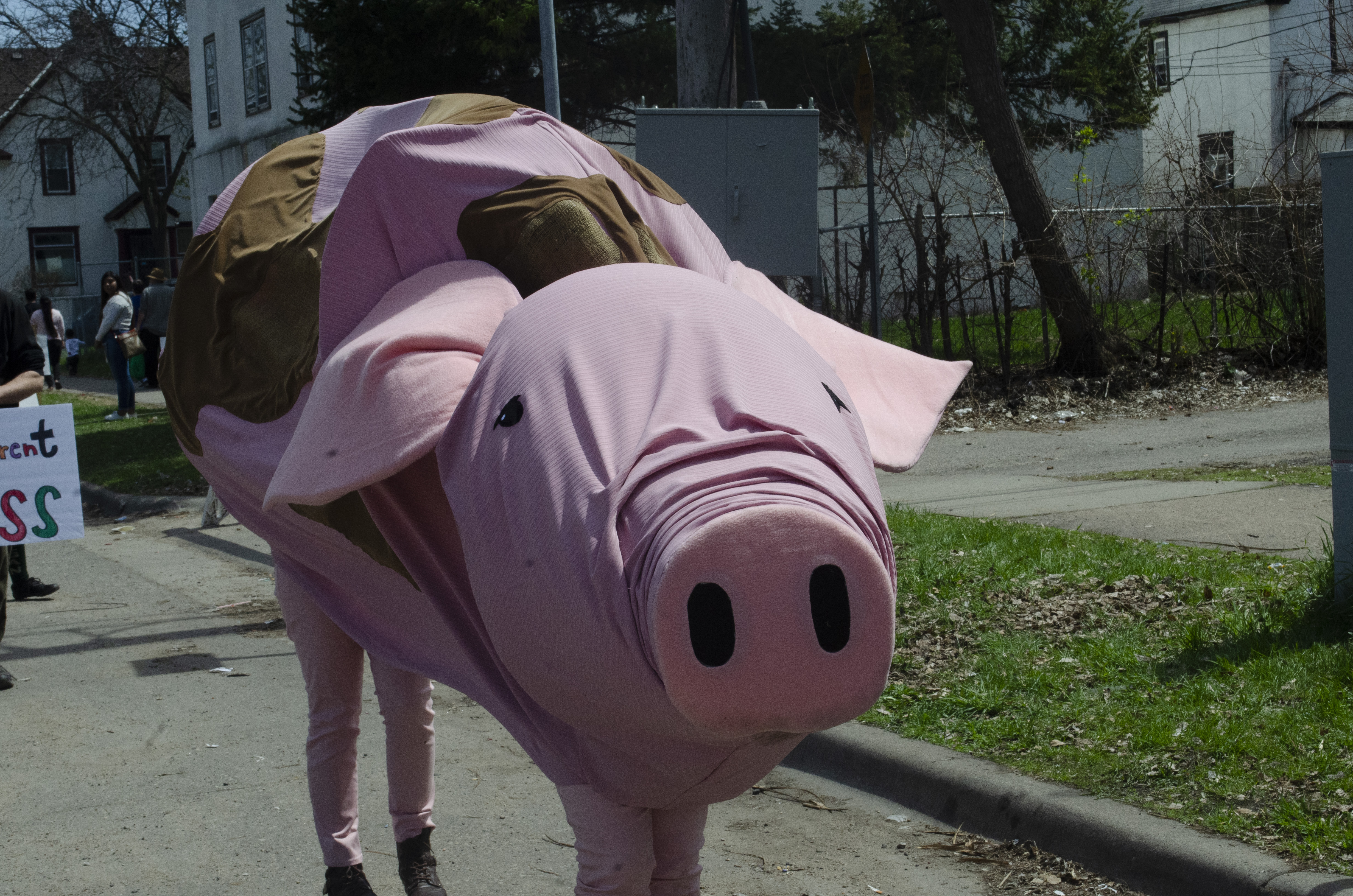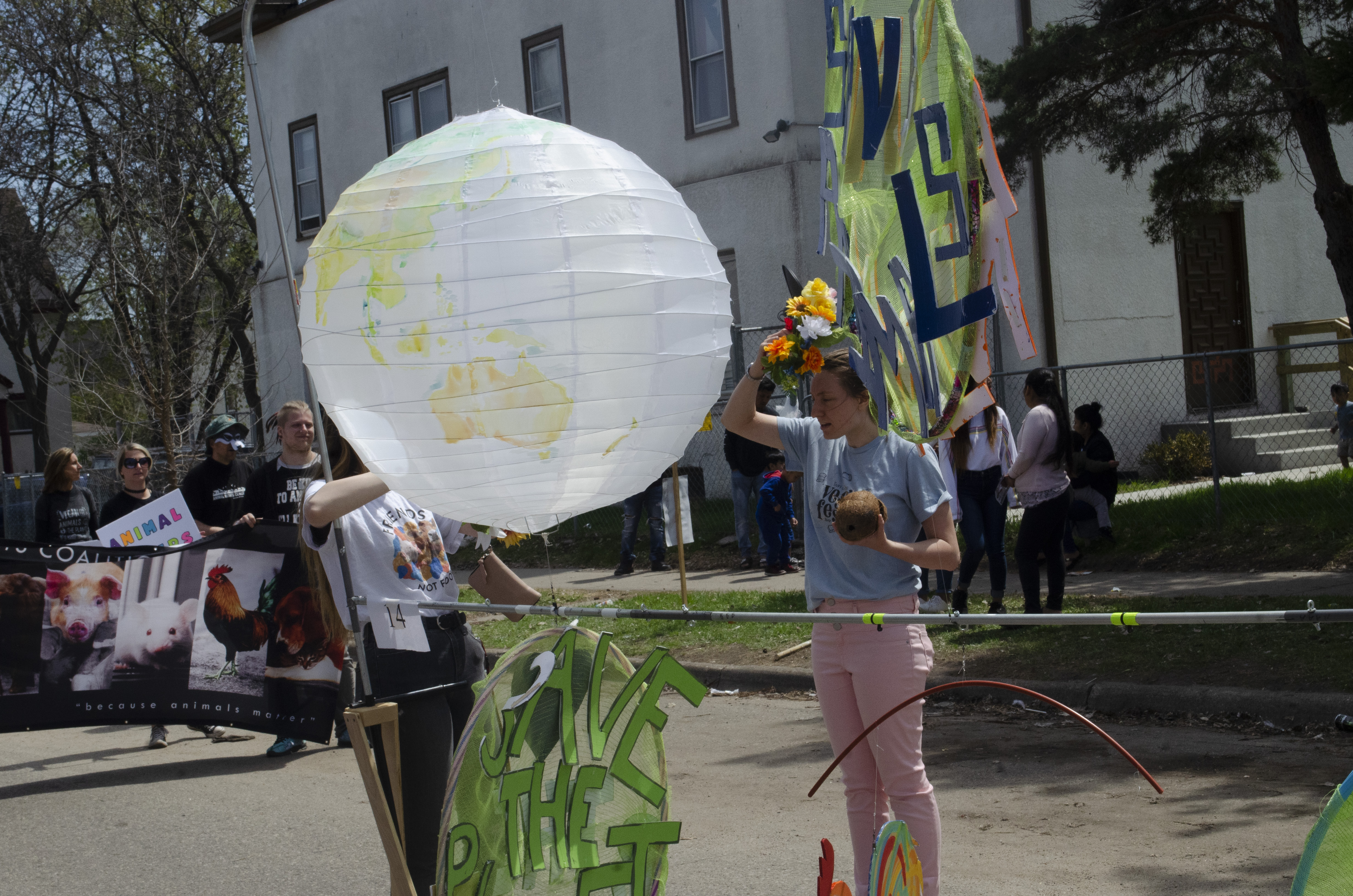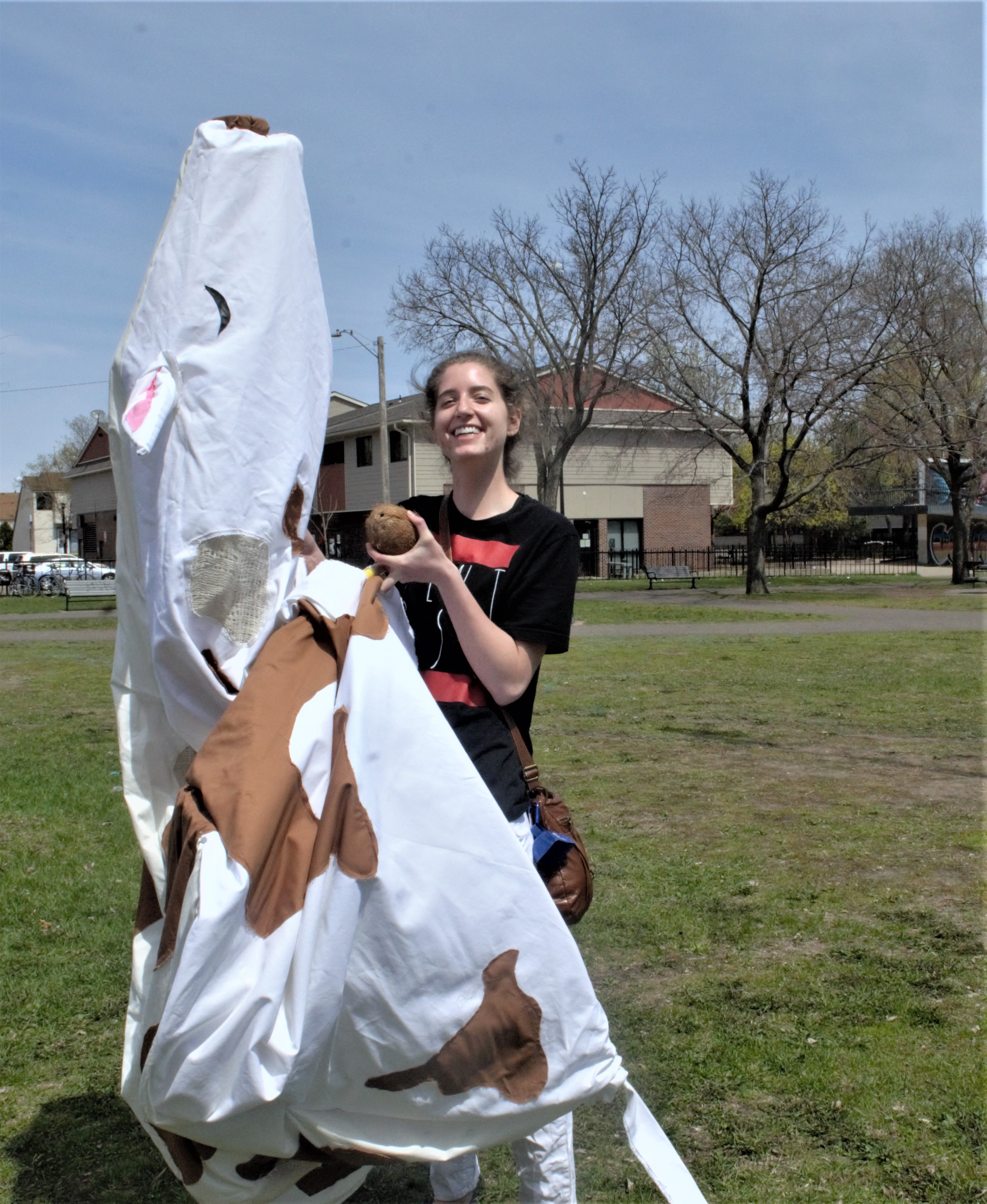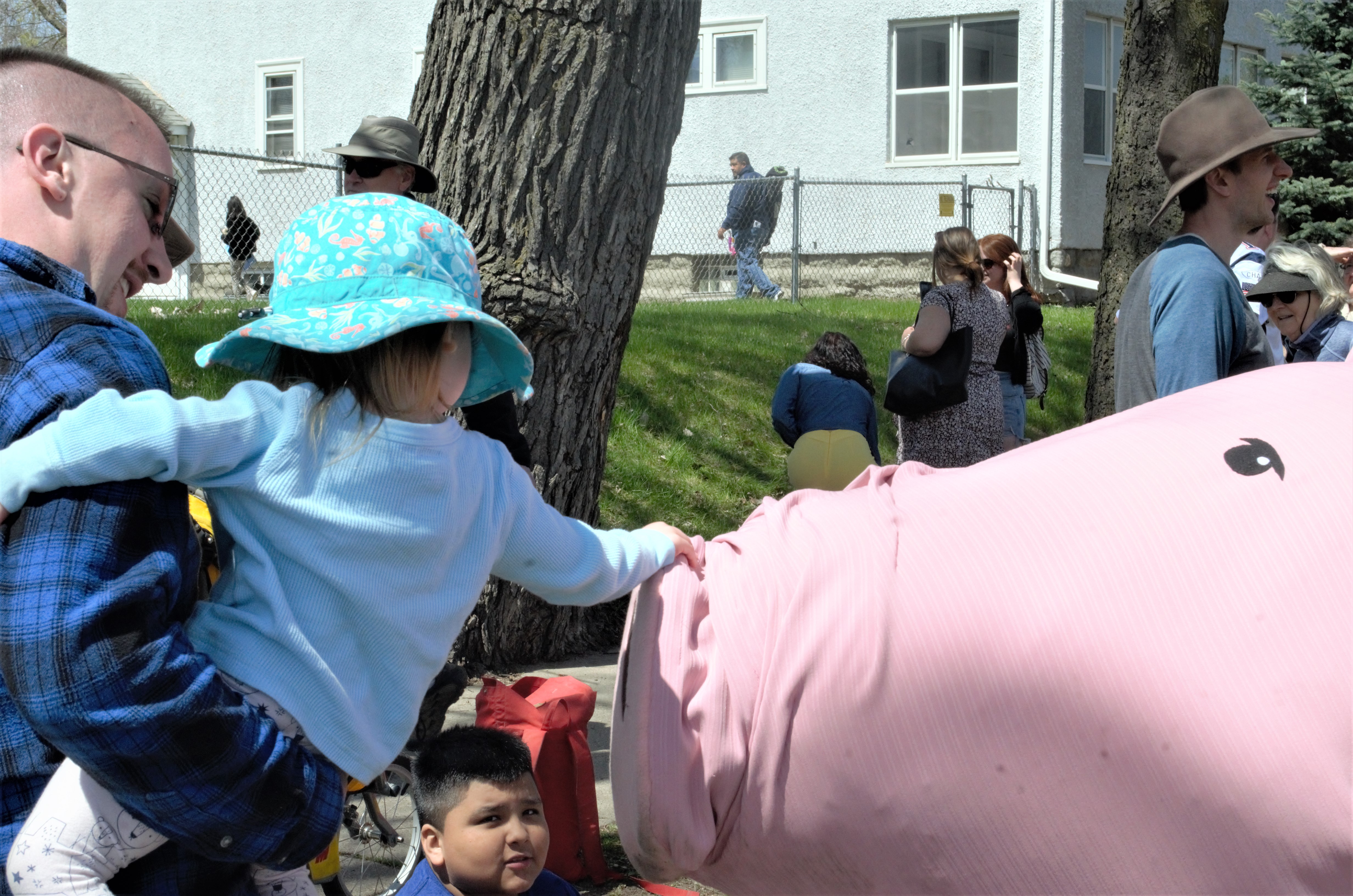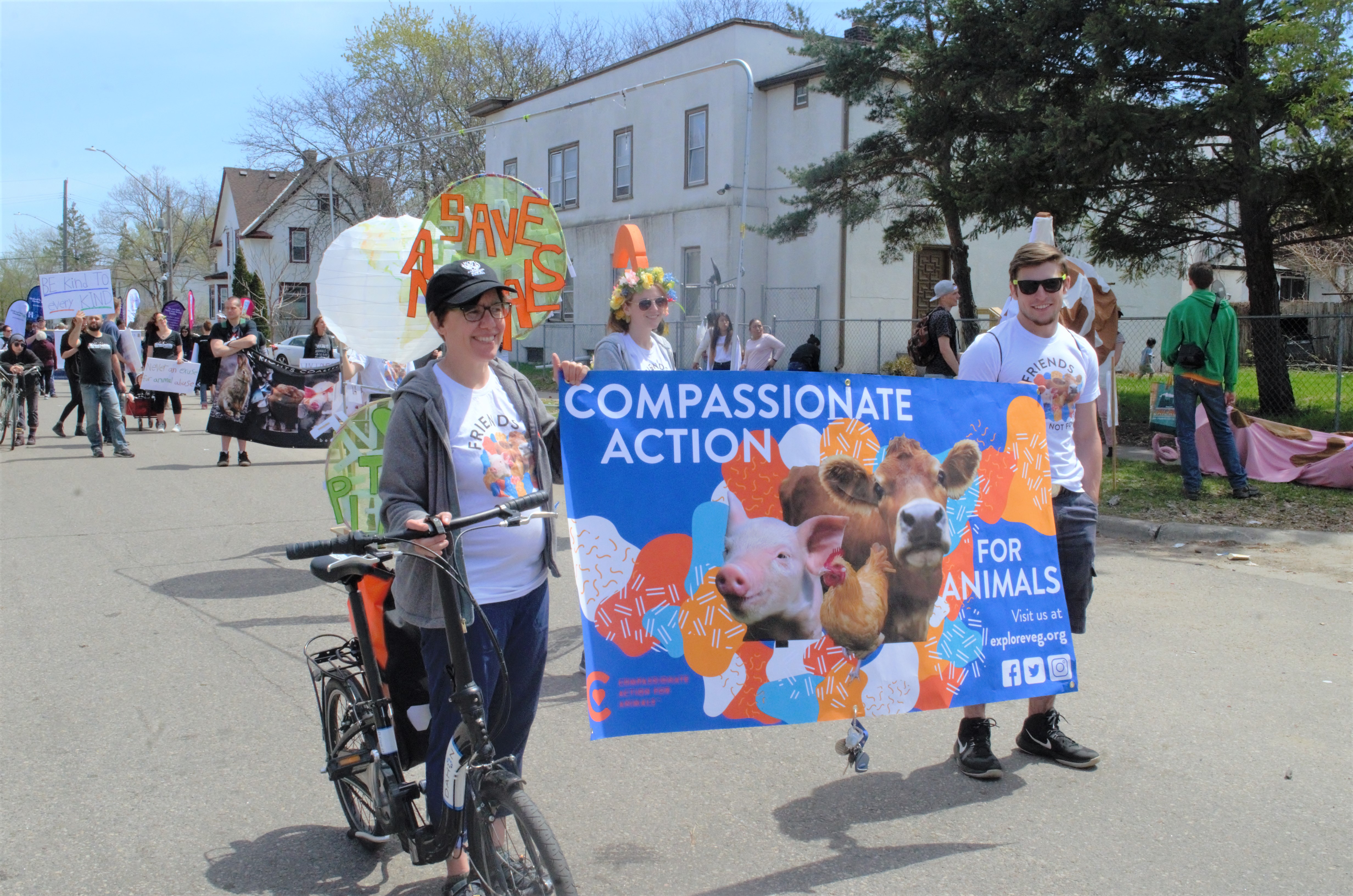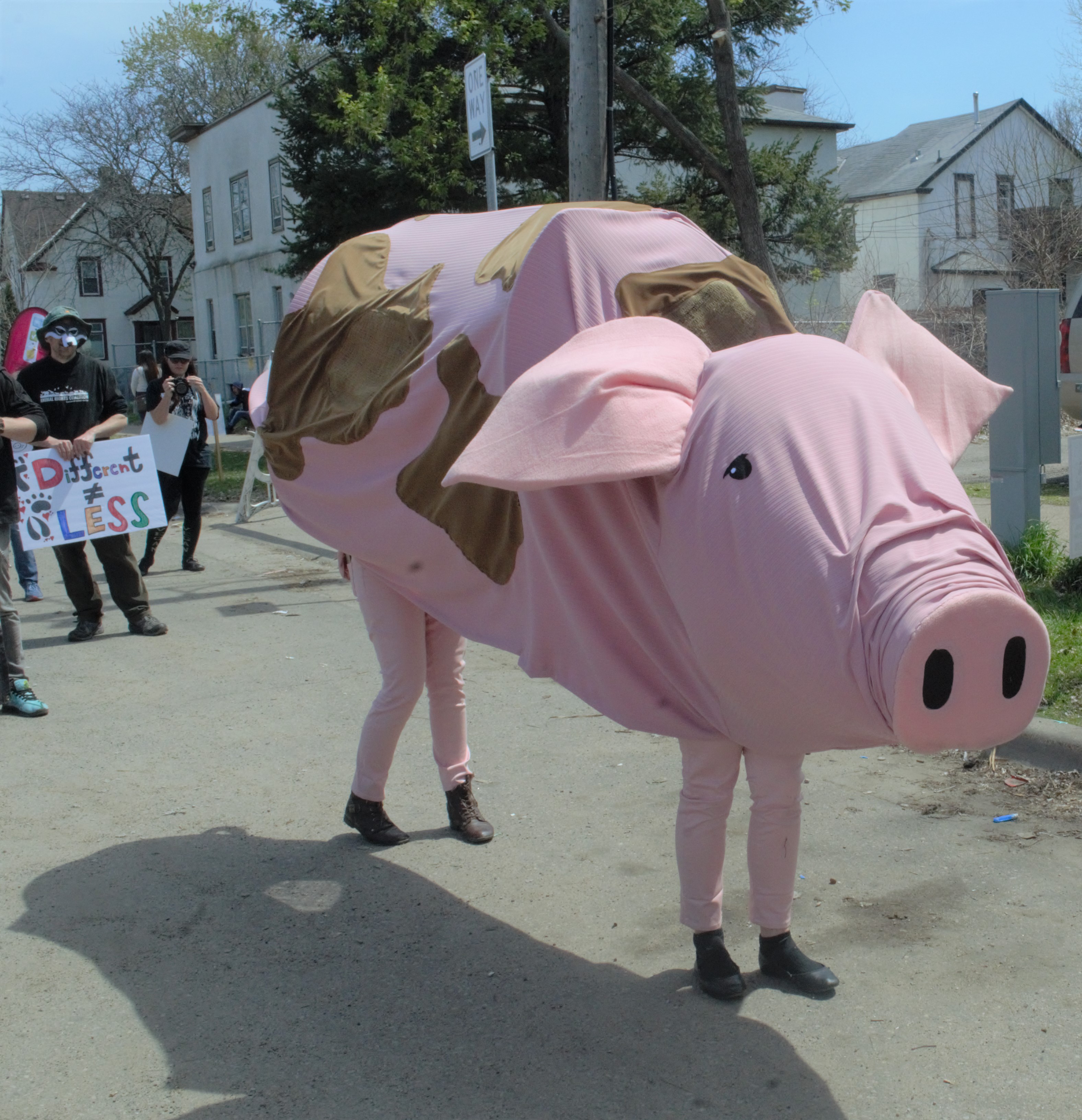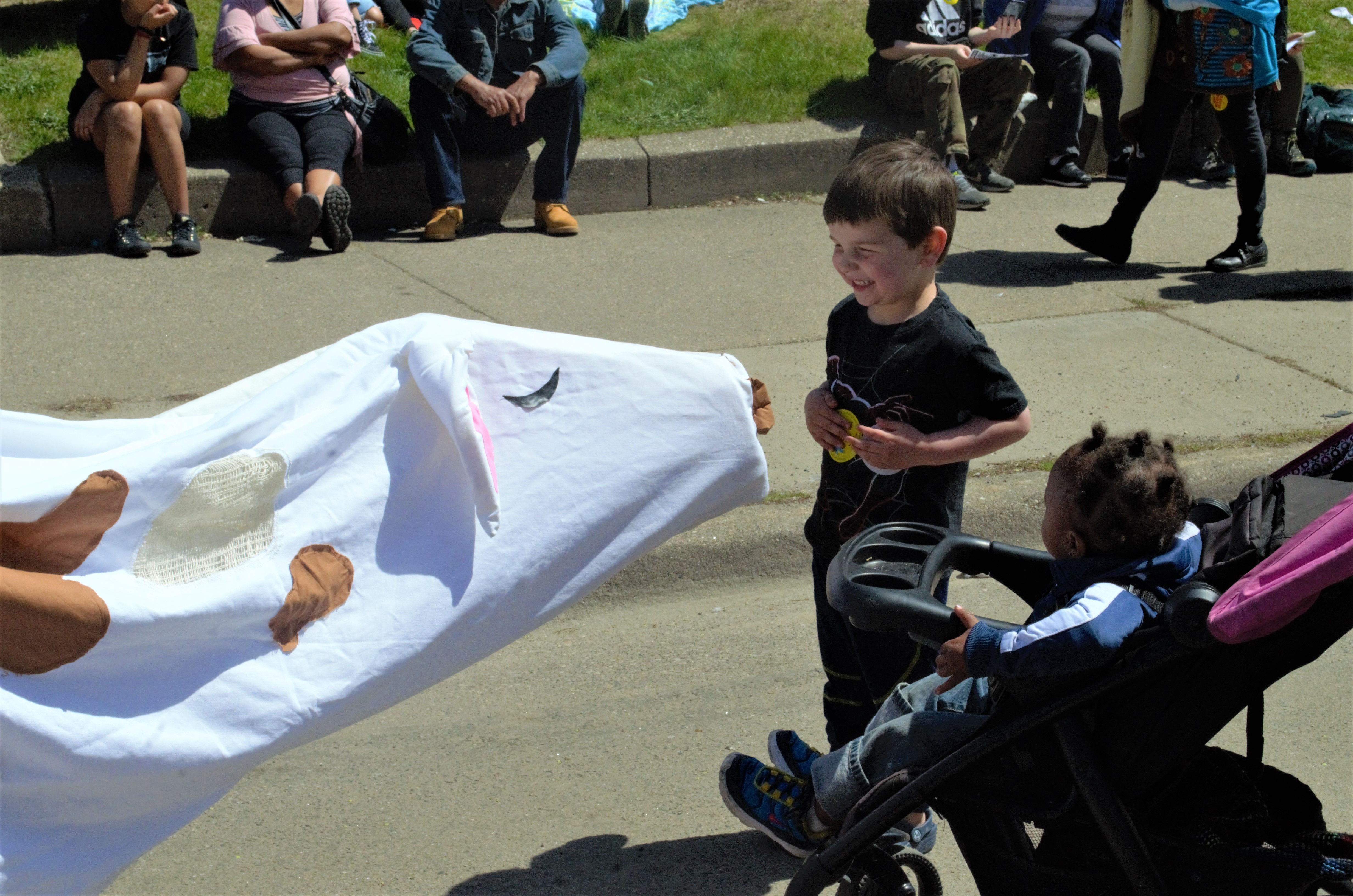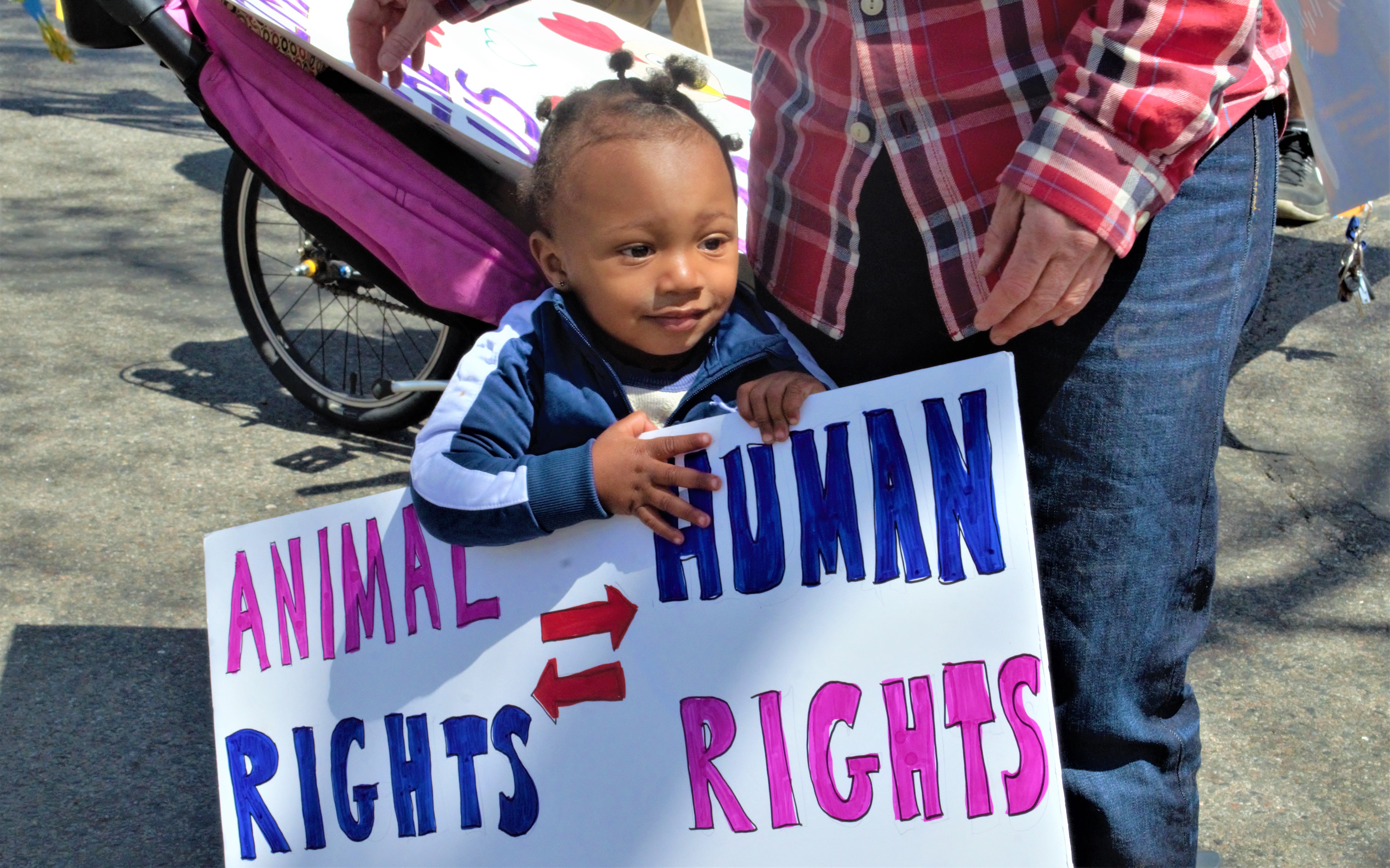You can subscribe to our blog using our RSS feed.
Surly Goes Vegan — What?!
Surly Brewing is going vegan on August 12 for our 2019 Twin Cities Veg Fest FUNraiser! You read that right—Surly Goes Vegan. This August.
You can choose to join us just for happy hour and appetizers, or buy a full event ticket for a scrumptious sit-down meal with karaoke afterward.
Volunteer Shout-Out: 2019 Festival Planning Committee – Part 1

Dedication, creative vision, and passion. The Twin Cities Veg Fest planning committee is short on none, and it shows—our festival has grown to be the largest Veg Fest in the Midwest, attracting over 9,000 attendees in 2018.
As the festival has grown in size, so has the committee! Over 20 people are working on this year’s festival to make sure that every detail is taken care of.
Some members are serving on the committee for the first time, while others have returned to help make this year’s festival the biggest and best yet and they can’t wait for you to experience it. This week, meet part of the team behind this year’s festival.

Suzy Sorensen
What’s your role on the festival planning committee?
Coordinating speakers to get new info out to attendees! Hope to inform and motivate those at Twin Cities Veg Fest.
How did you get involved with Twin Cities Veg Fest?
I was on the planning committee for the precursor, Their Lives Our Voices (TLOV) conference, not sure how many years ago! But have continued to be part of the event in some capacity ever since.
If you’ve been or helped organize before, what is your favorite part of the festival and what, if anything, is going to be different this year?
I love the great positive energy! So many kind-hearted, open-minded folks in one place. That’s been a constant!
What (or who) drew you to living a veg lifestyle?
I met a lobster and it changed my life.
When you’re not working on planning the festival, what are you up to?
Keeping up with my business, Move2Veg Nutrition. But also puppy sitting, reading, traveling, enjoying the garden and its wildlife!

Mitch Thompson
What’s your role on the festival planning committee?
I am this year’s assistant chair. There was a lot learned from last year’s successful move to Harriet Island. With a better understanding going in this year of the space, we will have an even better festival in 2019.
How did you get involved with Twin Cities Veg Fest?
I volunteered early on and things just grew from there.
If you’ve been or helped organize before, what is your favorite part of the festival?
Just seeing it come together and the constant flood of people makes all the work worth it.
What (or who) drew you to living a veg lifestyle?
My wife.
When you’re not working on planning the festival, what are you up to?
I am very busy these days, first working in the film/tv industry. I serve on several boards, including Compassionate Action for Animals (which puts on Twin Cities Veg Fest). The other boards are the HumanistsMN, and DEMO (Diverse Emerging Music Organization). I also play drums in a band called Umbrella Bed that I also help manage.

James Peña
What’s your role on the festival planning committee?
As Volunteer Co-Coordinator, I am responsible for recruiting, training, and organizing volunteers working at this year’s festival.
How did you get involved with Twin Cities Veg Fest?
I attended Twin Cities Veg Fest for the first time in 2017 and decided to become a volunteer in 2018.
If you’ve been or helped organize before, what is your favorite part of the festival and what, if anything, is going to be different this year?
My favorite part of the festival is that it builds community among like-minded people and raises awareness of the vegan movement.
What (or who) drew you to living a veg lifestyle?
I am thankful for the recent surge of plant milks and other specialty foods that have helped me make the switch after being vegetarian for a decade.
When you’re not working on planning the festival, what are you up to?
My interests include leftist politics (I highly recommend the Vegan Vanguard podcast), working out, and taking naps.

Shannon Lasnetske
What’s your role on the festival planning committee?
My role in the committee is as Volunteer Co-Coordinator, so James and I have been setting up the website for volunteers so that they can easily sign-up there to volunteer with us. We will also be organizing volunteers when we get closer to the event and working with them on the day of the festival.
How did you get involved with Twin Cities Veg Fest?
This is my first year being involved with the Twin Cities Veg Fest! Last year I attended the festival for the first time and I loved it so much. This time I’m so excited to actually be a part of it. I got involved through Laura, who I had met through events with CAA on the University of Minnesota campus.
If you’ve been or helped organize before, what is your favorite part of the festival and what, if anything, is going to be different this year?
I haven’t helped out with organizing the event before, but my favorite part of the Twin Cities Veg Fest is, of course, all the food! I think that this year there will be even more people then there have been in the years before, which is really exciting. It’s always great to see so many vegans and vegan vendors, so I’m pretty excited to see how it turns out this year.
What (or who) drew you to living a veg lifestyle?
When I was 17 I read a book called “Skinny Bitch” and it ended up being all about veganism, which I had never really heard about before. I ended up doing my own research and felt that I had no choice but to adopt a vegan lifestyle after everything I learned. Going vegan was one of the best choices I’ve ever made.
When you’re not working on planning the festival, what are you up to?
I’m studying! I study chemistry, French, and Arabic at the University of Minnesota. This summer I’m taking classes as well as working as a medical scribe and volunteering in the hospital whenever I can. I love going to the lake and spending time with my friends, but most of my time this summer has been spent in the library for sure!

Sam Barba
What’s your role on the festival planning committee?
I am Music Coordinator for Twin Cities Veg Fest 2019. My main focus is greatly increasing the focus of the music aspect of the festival, growing the volume of attendees, making sure everything on the main stage runs smoothly, booking acts, and creating an incredible event out of the After Party!
How did you get involved with Twin Cities Veg Fest?
2019 would be my first year! I reached out to Laura, Nathan, and Mitch, desiring to bring my expertise to the table, and help grow the music aspect of the festival. I’ve worked in music fest production for five years, and want to start marrying that community with the vegan community. My hope is to introduce more people to the vegan community, open their minds to a new lifestyle, and create lifelong vegans and activists.
If you’ve been or helped organize before, what is your favorite part of the festival and what, if anything, is going to be different this year?
I have not helped with this event in past years, but I am incredibly excited to announce that the music will be growing dramatically from 2018. Most people I talk to didn’t even realize there was music last year. It was a small tent stage, with a 4 track mixer. This year, we will be renting out the Target Stage and making the live performances a much stronger focal point of the fest.
What (or who) drew you to living a veg lifestyle?
When I was 16 years old, a woman gave me a PETA2 DVD at Vans Warped Tour. I had no idea what it was, watched it when I got home, fell down a nearly 4-hour rabbit hole of a documentary, and the rest is history.
When you’re not working on planning the festival, what are you up to?
For my day job, I am an Executive Account Manager for an amazing company, called Modern Coin Mart. We are the #1 source in the world for Scarce and Rare Collectable Coins.
My side hustle and passions include a production team I partner in, Romerdome Familia, doing music festivals throughout the summer, and homegrown events through the winter. This winter, we will be airing live on local television! I also play in two bands, Sammy Strings & The Can of Bliss, and The Bad Shine.
Lastly, I spend all of the rest of my time, loving my companion animals, protesting and volunteering for animal advocacy, am a Board Member for Rooster Redemption Animal Sanctuary, and of course, enjoy spending time with my lovely girlfriend, Ashley Riddle; of which I am so proud! She is the Program Director for Animal Rights Coalition and works so hard for animal advocacy.
___________
Twin Cities Veg Fest is our biggest event of the year, and we need lots of enthusiastic volunteers to help make it a success. Sign up here to be a volunteer and help make this awesome vegan Minnesota get together happen!
Bringing Veganism to the Minnesota State Fair

Written by Florence Brammer
When I moved to Minnesota in the early ’80s, one of the first things I grew to love was the Minnesota State Fair. Though never a farm girl myself, I was born and raised in Indiana and enjoyed entering Indiana State Fair creative activities competitions as a 4-H’er in the 1960s.
When I moved to Minnesota from New York, I was happy to learn that adults could participate in the creative competitions of the Minnesota State Fair, and promptly began entering baked goods and other creative activities entries on an annual basis.
In 2010—as a direct result of attending the third Compassionate Action for Animals’ “Their Lives Our Voices” Midwest Animal Advocacy Conference—I made the decision to transition from a vegetarian to a vegan diet and lifestyle.
After making the decision to be vegan, I immediately began to lobby the Minnesota State Fair to include a vegan baking category to its competitive baking categories. While the fair officials declined to create a vegan baking category, they did agree to create a Vegan Main Dish category, beginning with the 2011 fair.
What’s the Vegan Main Dish contest?
As only the second state fair in the country as of 2011 to have a competitive vegan cooking category (Iowa was the first), the Minnesota State Fair’s decision received wide and favorable attention in local and national press.
The number of entrants has grown annually, and thanks to the creation of this category and the participation of fair fans, thousands of fairgoers are able to see the wide-ranging appeal and variety of plant-based, cruelty-free main dishes.
How to enter
Entering a vegan main dish in the state fair is free, easy and fun. And you might even win a ribbon, a small stipend and—if you are the first-place winner—an additional special prize, the Twin Cities’ own Robin Asbell’s newest vegan cookbook, Vegan Meal Prep: A 5-Week Plan with 125 Ready-to-Go Recipes.
All the information you need to enter can be found here. Look at Special Contest #1085 for all the details. Pre-registration is required by August 6.
See you at the Fair!
Vegan Recipe Club – A Few Hints for July 2019

Written by Henry Patterson
Planning on coming to the Vegan Recipe Club on July 16? Here are a few hints for some of the selected recipes to get you started:
Purple Potato Salad with Whole Grain Mustard from “The Vegucation of Robin” on page 136
July is the start of the Potato season, and August is typically the peak but you can still find Purple Potatoes around town.
At this time of the potato season you might find the purple potatoes to be on the small size, so consider doubling the quantity from 4 to 8 depending on the size of potatoes you find.
Check your local farmer’s markets starting June 29 to see if they are readily available.
I found purple potatoes in a variety pack at Lund & Byerly’s (Terrific Trio – Little Potato Company brand). I’ve been told variety packs with purple potatoes are also available at Trader Joe’s. I’ve seen a variety pack from Melissa’s Gemstone Potatoes which also has purple potatoes. You may only find 4-5 small purple potatoes in the variety packs, though. If you can’t find something in the store, check with the produce manager at your local grocery store, they might be able to order for you to pick up locally.
Blueberry Cobbler with Lime and Coconut from “Whole Food Heaven in a Bowl” on page 124 (optional recipe)
The original recipe is vegetarian, not vegan. Here are some substitutions we recommend to make it vegan (and gluten-free!).
Replace the 1/2 cup unsalted butter with one of the following:
- 1/2 cup of Earth Balance
- 1/2 cup of refined coconut oil, softened
Replace the 1 cup of whole milk with one of the following:
- 1 cup of coconut milk
- 1 cup of lite coconut milk
- 1 cup of other non-dairy milk (i.e. almond, soy, rice milk, etc.) look for unflavored or plain varieties
Replace the optional ice cream/whipped cream with one of the following:
- Vegan ice cream, (Soy Dream, Rice Dream or something similar)
- Vegan Whipped Cream, Reddi Whip makes a few non-dairy whipped creams (almond and coconut, etc.)
If you’re planning on making the recipe gluten-free:
Replace the 2 cups of whole wheat self-rising flour with a gluten-free flour blend OR try out this gluten-free flour blend recipe:
- (Whisk together all of the following)
- 1 cup gluten-free oat flour
- 1 cup sweet rice flour (Mochiko Sweet Rice Flour works well, and is available at most Asian Markets, and some larger grocery stores)
- 1 tablespoon tapioca flour (tapioca starch)
- 2 teaspoons gluten-free baking powder
- 1 teaspoon ground cinnamon
Vegan Recipe Club – Getting Started

Written by Henry Patterson
What is the Vegan Recipe Club?
The Vegan Recipe Club is for everyone—those curious about vegan cooking and those more experienced with it.
It’s a chance to build community with fellow participants and try making some great new food!
It’s also a chance for CAA to connect with folks who might be shy about attending our events but feel comfortable learning about veganism in a library setting.
And we know all the benefits a vegan lifestyle can have. This club will help the animals and the environment, and potentially people’s health.
Recipes are being chosen with an eye toward supporting folks from communities of color who are experiencing health disparities.
The club is also an opportunity to help the East Lake Library branch and the community by participating in and promoting the use of the library collections.
How does it work?
In the month prior to the Vegan Recipe Club Meeting, head on over to the East Lake Library (2727 East Lake Street, Minneapolis, MN) and pick up a copy of the recipes to peruse or check out the cookbooks for use at home.
Try making one or more of the recipes then come to share and discuss what you thought about them with the group.
If you have questions about the recipes or the Vegan Recipe Club before the first meeting, message the Compassionate Action for Animals Facebook page or email [email protected].
Who is it for?
The Vegan Recipe Club is for Vegans, Vegetarians, Flexitarians, those who do Meat-Free Mondays, dieters, and everyone else. It’s for non-cooks, novice, and expert cooks alike.
Maybe you want to attend because you:
- Are interested in going vegetarian or vegan
- Have children, family, or friends who’ve gone vegan or vegetarian and you’d like to offer them more than a salad to eat
- Are willing to share veg cookbook recipes and/or web recipes with a group of like-minded people
- Are open to sharing vegan recipes you’ve tried and review cookbooks
- Have questions about a recipe you’ve seen and would like to try out
- Are willing to share tips and discoveries with others
- Have another reason!
When is it?
The Vegan Recipe Club meets on the third Tuesday of every month from 6:30pm – 7:30pm. The sessions planned for 2019 are:
- July 16
- August 20
- September 17
- October 15
- November 19
Where is it?
East Lake Library
2727 East Lake Street
Minneapolis, MN 55406
About the Facilitator
My name is Henry Patterson. Like many, I didn’t grow up as a vegan or vegetarian but did grow up with a love and respect for animals. I am a board member and volunteer at Compassionate Action for Animals.
What drew me to veganism?
My younger brother became a vegetarian first, and after he read Diet for a Small Planet 1971, by Frances Moore Lappé he challenged me to make the switch. It took a little convincing, but I did. I started as a pescetarian (some seafood, but primarily a vegetarian diet). The benefits were improved health, including reducing the risk of colon cancer that runs in my family.
I switched to a 100% vegan diet seven years ago, in June 2012, and haven’t looked back since.
Why the interest in the Vegan Recipe Club?
Like my entire family, I have always loved to cook and have cooked for friends and coworkers for years. My favorite dishes have changed over time, but soups, stews, curries, French Ratatouille, and tofu scrambles remain amongst the ones I love to make and share.
Recipes for July 2019 discussion
The 4th of July Holiday is coming up and it might be the perfect opportunity to try out your cooking skills on family and friends.
Enjoy the recipes and feel free to share photos of your creations with CAA on Facebook or Instagram @exploreveg.

“The Vegucation of Robin”
Find it at the library (Quivers, Robin, and Rachel Holtzman. The Vegucation of Robin, 2013) or on Amazon.
- Marrekesh – Blend Squash Soup, page 126
- Purple Potato Salad with Whole-Grain Mustard, page 136
- Ratatouille, page 182
- Optional recipe: Basic Polenta, page 195

“Wholefood Heaven in a Bowl”
Find it at the library (Bailey, David, and Charlotte Bailey. Wholefood Heaven in a Bowl, 2017) or on Amazon.
- Optional recipe: Blueberry Cobbler with Lime and Coconut, page 124
Thanks to:
- Anna Zillinger and Ayanna Muata, Hennepin County Library staff at East Lake Library branch, for all their work in planning and supporting the program.
- The Vegan Recipe Club is based on the Vegan Cookbook Club which was started in December 2016, at the Mount Royal Branch of the Duluth Public Library (DPL). The Duluth project was initiated by Bonnie Ambrosi and Alicia Peterson and continues thanks to Bonnie’s leadership. Thanks to Bonnie for reaching out to CAA about the idea of starting something similar.
- Compassionate Action for Animals (CAA) for promoting outreach and education programs that support and build an animal-friendly community in the Twin Cities.
CAA Awarded 2019 Effective Animal Advocacy Fund Grant
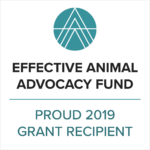
We’re excited to announce that Compassionate Action for Animals has been selected as a grant recipient of Animal Charity Evaluators’ Effective Animal Advocacy Fund!
Thanks to this grant of $40,000, we’ll be one step closer to hiring a community organizer to support the growth of plant-based eating and animal advocacy in Twin Cities communities of color.
We want to make sure that we can support this position for several years and are exploring partnerships and additional funding to make this a reality.
If you have thoughts or want to be involved, please email Laura Matanah.
This grant will enable CAA to build on its work of the past two years including:
- Leadership from Latinx volunteers in organizing our Cinco de Mayo video outreach
- Support of Coco and Lala’s work to expand plant-based eating in the African-American community (check out our 2019 events!)
- A new Vegan Cookbook Club program in partnership with the Hennepin County Libraries which will include recipes and thoughts about animal-rights and veganism written by people of color
- The Wholesome Minnesota program, which increases plant-based food offerings in institutions such as schools which serve communities of color
- Expansion of the Explore Veg Mentor Program
You can learn more about the grant and process by clicking on the image above.
Vegan Teen Spirit! – Growing Up Vegan Part 4

Written by Suzy Sorensen, RD, LD, CDE
Vegan teens should choose a variety of foods and aim for a balanced plate including fruits, vegetables, grains, and legumes at most meals. Teens can meet all their nutritional needs through a mindfully planned vegan diet!
Research shows that vegan and vegetarian teens tend to be well-nourished compared to their non-veg peers. Generally, they have lower cholesterol, lower risk of obesity, and healthier weight for height. Vegan teens eat less fast food, fewer salty and sweet snacks, and have a higher intake of fiber, iron, vitamin C, and vitamin A.
One other health benefit that has been observed: vegan teens often have a later onset of menstruation which is associated with a decreased risk of breast cancer.
Studies suggest there is no difference in growth between vegan teens and their non-veg peers. Teens do have higher calorie needs than adults to support growth, needing as much as 50% more calories than their parents. For girls, once menarche is reached, their calorie needs decrease as growth slows.
There are a few key nutrients that are important at this critical stage of growth. See the table (on right) for details (1). Food is always the first choice, but a once-daily vitamin may be helpful to assure micronutrient needs are consistently met.
Vegan athletes usually need additional calories to support physical activity. It’s easy to add in snacks like trail mix, mixed nuts, dried fruits, smoothies, crackers with nut butter or hummus, or healthy granola bars to meet the needs of growing teens on the go.
It’s increasingly easier for vegan teens to “match” what their non-veg peers are eating to decrease the potential for feeling different or left out. Vegan pizza, burgers, burritos, corn dogs, nuggets, and more are available at grocery stores, and more and more restaurants and food trucks offer vegan versions of classic favorites.
While it is important to respect a teen’s need for privacy and independence, it is fair to expect participation in family mealtime including responsibility for helping with meal prep or clean up and sharing the meal.
Teenage years can be an exciting time for exploring independence and learning about one’s place in the larger world! Many teens from non-veg families choose to try a vegetarian or vegan meal plan as they learn about the environmental impact of raising animals used in the food industry and the ethics of consuming them. Others teens who have grown up in a vegan family might experiment with eating meat away from home as they make more independent choices and are influenced by peers. As Brenda Davis R.D. and Vesanto Melina M.S., R.D. say in their great reference book, Becoming Vegan, “For parents, this is a great time to learn a lesson about boundaries and letting go.”
However, we can provide a foundation of compassion and healthy eating that allows teens to make informed choices and encourages plant-based eating!
(1) Adapted from the Vegetarian Nutrition Dietetic Practice Group resource on Vegetarian Teens.
Please note: This information, while accurate, does not provide an all-inclusive feeding plan and is not intended to substitute personal medical advice. It is intended to offer guidance only. We recommend working with a registered dietitian to help meet any specific questions you may have.
______________
Suzy Sorensen is a Twin Cities-based Registered Dietitian and Certified Diabetes Educator who is passionate about plant-based eating! She has a Certificate of Training in Vegetarian Nutrition from the Academy of Nutrition and Dietetics and opened Move2Veg Nutrition Counseling in 2009 to support those interested in plant-based eating. For more information, visit move2veg.com.
July Brings A Vegan Invasion
The vegans are organizing! If you haven’t heard about the new vegan food festival and drink sampler by now, get ready to be excited—the first Vegan Invasion is this July.
Featuring a growing list of vegan food vendors (including The J. Mobile, Comfort Candy, Crepe & Spoon, Evans Organic Eatery, Hope’s Vegan Kitchen, Keiko’s Kitchen, Radical Eats, Prairie Vegan Pies, Seed Cafe, Spinning Wylde, Vegan East—and of course, Reverie Mobile Kitchen and The Herbivorous Butcher Food Truck), local craft brews, spirits, non-alcoholic options, as well as vegan retailers, this event is sure to leave no craving unsatisfied.
To learn more, we asked the organizers about what inspired their event and what you can look forward to—read on for a sneak peek!

What is Vegan Invasion and what led to its creation?
Organized by The Herbivorous Butcher and Reverie Mobile Kitchen, Vegan Invasion: Food Festival & Drink Sampler is a new annual event celebrating all things vegan. Vegan Invasion will host its inaugural event at Lake Monster Brewing on July 14, 2019.
Just like a beer sampler, festival attendees receive a souvenir glass and are invited to sample unlimited alcoholic and non-alcoholic beverages including beer, wine, cold brew, kombucha, and craft sodas. Food and retail products from plant-based businesses are available at an additional cost. At this festival, everything—all drinks, food, and retail items—is vegan.
Vegan Invasion is inspired by festivals around the country, and we regularly talked about throwing a good party that included alcohol and food. Vegan Invasion is the outcome of those conversations. We piloted the Plant Based Showcase in 2018 and quickly realized there was a strong interest in a vegan event that brings together food and drink. This time, DJ Jake Rudh will spin records on the patio, adding an extra layer to the festive atmosphere.
We want the Twin Cities to have a fun party where we could both showcase and support the growing plant-based food and drink scene in the Twin Cities and beyond. We also want to create an environment where plant-based eaters can come and eat whatever, drink whatever, and shop without having to worry about labels. There is so much creativity, passion, and innovation going on in the Twin Cities right now based around creative food and craft drinks, this just seems like a great time to join the celebration.

Together, The Herbivorous Butcher and Reverie both have a great deal of festival experience. As the first vegan food and drink sampler event in the Twin Cities, were there any other events that influenced the creation of Vegan Invasion?
We’re big fans of craft beer festivals and there are so many great ones around the state; we like the convivial spirit amongst breweries and the way they foster creativity and innovation. We hope our festival will do the same for both the beverage and the food side of things. Twin Cities Veg Fest has been an annual plant-based festival for over seven years and they have been inspirational and supportive to so many of us; it is now the largest plant-based festival in the entire Midwest and a super fun event to attend.
Vegan Street Fair in North Hollywood was instrumental in the logistics behind organizing vendors. There is an art to what they do, and their assistance put us light years ahead of where we would have been otherwise. The Herbivorous Butcher has also been a vendor at EatDrinkVegan and Coachella, both of which provided insight into what is needed to plan an event of this proportion.

Were there any takeaways from the events you’ve been at across the country that you wanted to bring into the event?
We admire the structure of Vegan Street Fair and its dedication to hosting a truly inclusive event. Events can be quite cost prohibitive to both vendors and attendees, so we kept accessibility in mind when selecting pricing structures.
We’ve enjoyed drooling over wild food creations and have encouraged our prepared food vendors to think outside the box and come up with some Instagram-worthy dishes. Festivals such as ours are the perfect time to try new things and attract both new and returning customers.

Is there anything you want Vegan Invasion attendees to leave with?
We hope that everyone who attends has fun, meets new people, and is introduced to new businesses. Our ultimate goal is to enhance community.
How can folks get their ticket?
Head to veganinvasionmn.com for ticket information.
General admission is $25 through July 13 and $30 the day of the event. We also have a VIP option, as well as ticket options for designated drivers and attendees who are underage.
Is there anything else you’d like people to know about Vegan Invasion?
This festival is for everyone, and we want everyone to feel welcome regardless of their current food preferences. We have so many great breweries, some of them from out of town, non-alcoholic options, and there will be amazing and creative food that will make this an unforgettable experience.
Hark Cafe—Serving Up Gluten-Free, Vegan Decadence in Uptown

Meet Lisa and Katherine, the owners and creatives behind Hark, a 100% vegan, gluten-free, celiac-safe bakery based in Uptown.
The idea for Hark came to the duo when they were in school together over six years ago. They would often create different veganized dishes and baked goods to share with friends. “We were talking about what we wanted to do after we left and the idea was that we would someday have a vegan cafe,” recalls Lisa.
After graduating, both moved to New York—Lisa managed a vegan restaurant and Katherine shortly moved to Minneapolis to work at the Guthrie as a theater artist. During this time, the two didn’t forget about their idea.
“A series of events happened where it was going to be possible for Lisa to move here and we thought, ‘Oh, we could actually do that. It doesn’t have to be a crazy dream where people are talking to you all the time like, It would be so great if you guys opened a place where we could eat your food all the time,’” says Katherine with a smile, “And then she moved here in November and here we are.”

So far, the two have been making their gluten-free, vegan sweets and savories—including bagels, donuts, cinnamon rolls, and king cakes—for private events (including a house show), pre-orders, and pop-ups and plan to have more items available for pre-order soon, including cheese.
“I ferment vegan cheese, like brie, blue cheese, and goat cheese, and in order to sell that we have to have other licenses that we don’t have yet. So that’s next,” says Katherine. “I have a little fermentation fridge in my house—I bought a wine fridge because you can temperature control them so that it’s stable and safe to eat and right now I have four wheels of brie in there that are a mixture of macadamia and cashew and then I have five or six blue cheeses in there—it’s cool, it smells great.”
Worth noting, Hark in its original ideation wasn’t going to be gluten-free—the duo added that as an element after Katherine found out she has Celiac Disease a little over a year and a half ago. “It severely limits the amount of things you can eat. It’s not just like, ‘I’m gluten-free but I can still eat out.’ In fact, I can’t eat gluten-free things at places because cross-contamination is deathly dangerous,” explains Katherine. “So a lot of it was me going, ‘Ah, I wish I could eat my favorite pies and cinnamon rolls and donuts again.’”

Bagels were one of the things the duo started with. “Most gluten-free baked goods have eggs in them,” explains Katherine, “because without gluten or something to hold it together, most manufacturers use eggs.”
The two have worked quickly to make many of their vegan favorites gluten-free while paying special attention to taste and even diving into research into the chemical structure of different ingredients to create the most balanced blend of flours for their gluten-free flour blend and their cheeses. Everything else is made from scratch too, including the soymilk, vegan butter, and mayonnaise they use in their recipes, and they put each recipe through a number of tests before they deem it ready to share.
Neither studied chemistry in school—they’re just passionate about their food. “It’s a good thing that we’re nerds,” says Lisa with a laugh.
After their experiences living in New York, the two hope to bring vegan bagels to Minnesota. Katherine starts, “To be able to just go out and get a tub of cream cheese and some lox and bagels and bring it back to your apartment for brunch—” “—is so a thing in New York,” finishes Lisa.
The two are in the process of looking for a brick and mortar that serves as a neighborhood hang out spot for vegans and non-vegans alike and carries ready-made items like blue cheese dressing (or blue cheese cheesecake!) as well as bagels and cream cheese and other plates to enjoy in-house or out. “We both have the sneaky approach to veganism with folks—we like to give them a friendly introduction to incorporating vegan food in their life,” says Katherine.

Lisa adds, “The place that I worked at for a long time in New York was a vegan fast food place and it was the same idea but from a different angle—how do we make something accessible and approachable for people who aren’t vegan but are kind of curious about plant-based or just want to try something different. I think that’s the goal.”
“Yeah, in addition to vegans being able to enjoy food they really didn’t think they would be able to have again,” says Katherine. “We did a first taste of the blue cheese I’ve been making the other night and I never thought I would get to eat that flavor again. It’s creamy, smelly, so blue cheesy.”
Can’t wait to try something from Hark? Right now, you can order cinnamon rolls, bagels, and donuts. Email [email protected] to place your order and follow them on Facebook for updates.
MayDay 2019 Photos
Did you get to see our awesome puppets that got folks interacting with farmed animals at the MayDay parade this year?
Whether you were there or not, you’ll enjoy this photo slideshow!
CAA volunteers and members of our University of Minnesota group participated in the march alongside the Animal Rights Coalition.
This year’s display featured a new CAA banner as well as a new walking pig puppet to accompany the walking cow puppet, both brought to life by Marina and Liberty Kirkeide.
The interactive and fun nature of our presence got folks engaged with animals issues and encouraged them to take the next step towards a vegan diet.
Many thanks to Liberty Kirkheide and Maya Ulrich for taking photos!

